#i need to make a comic out of this . but for the sake of allegory ruben is not just her little brother but Also her
Explore tagged Tumblr posts
Text
shirley transgender 🫶
#i need to make a comic out of this . but for the sake of allegory ruben is not just her little brother but Also her#she spends her childhood raising this guy and the moment she’s alone for the first time since . she freely expresses herself#shirley as an allegory is interesting to me because she never actually changes . every other character but her has a proper arc that i want#to explore !! but shirley is always just shirley . she is always exactly who she wants to be in that exact second but Not bc she can#magically change her appearance#also just bc i said so . btw#she is not just an allegorical trans person she is also just trans . that’s important too#realized at 17 or 18 and never looked back#ohh just realized she also transitioned on a meta level . she was originally just a pink clone of a male character#anywaysies . i like talking abt it bc in the actual story it rarely ever comes up and is never an actual problem with stakes#as of rn* haven’t written the dam thing#m
2 notes
·
View notes
Text
Ok real quick gonna propose an idea for that powerpuff girls reboot:
Don’t
But it if they really must (they shouldn’t!), there’s some better ways I think they could go about it, as well as what I’ve seen floating around (like don’t).
Pretty much all of these are assuming they’ll go the gritty reboot route because that’s pretty popular atm. A dark gritty take on anything is getting a bit tired, I think people are more open to weird and sincere stories, whether they’re adaptations or original. But recently a lot of comics (good comics!) 10+ years old are getting faithful adaptations (good adaptations!) and reviving that early/mid 2000’s taste for “what if Superman, but bastard?”

Aright one route they could go would be like that of Samurai Jack season 5 on Adult Swim. Written and animated by the original team and keeping to its truest nature while maturing it a bit along with the original fan base and maybe have an overarching plotline. The difference being that keeping it like the original ppg would create a stronger contrast with more mature and brutal violence, similar to Invincible’s friendly neighborhood Spider-man vibes and use of graphic violence.

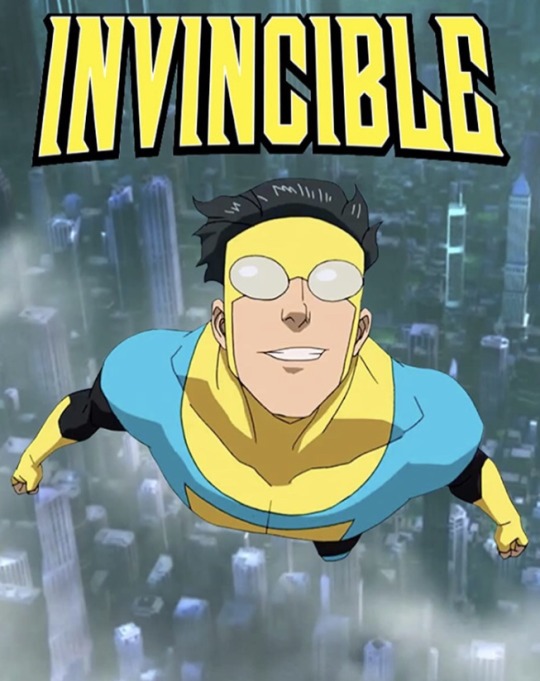
This would be the second best way to adapt besides not doing it at all..... but that would also take more money and might not last beyond a season, ending with a solid conclusion like Samurai Jack did. Plus I’m semi doubtful the original team would be on board to drag out the girls’ story, especially like this.
Addressing the leaked script, a common comparison made was to the Netflix adaptation of The Umbrella Academy. Both are loose adaptations about child superhero siblings coming together after years of being apart, dealing with childhood trauma and their parent’s wrecklessness as adults.
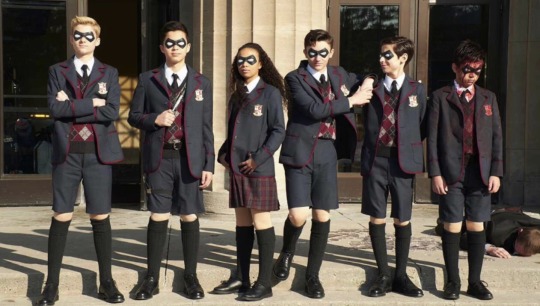

And talking monkey.
Where Umbrella Academy made changes for the sake of depth and character development amidst the sci-fi madness, the CW Powerpuff Girls script attempted to be edgy and gross for the sake of being edgy and gross. They just want to be mature and topical while ignoring everything enjoyable about the original. It also just straight up sucks. I’m no writer but it seems like a lot of people who are writers are pretty pissed about paid professionals pushing this to the point of post-production. Well not post production, it was being filmed, but I enjoy alliteration. That’s also pretty far into development for something this bad, while it was rejected and is being reworked, it still got approved by enough people to shoot a pilot. If the leaked script itself isn’t a marketing ploy, I imagine that’s the real reason it was shut down. CW probably would’ve went through with it, otherwise. Maybe just keep it cancelled, yeah? Yeah.
This idea isn’t mine either but instead of the child star allegory, it could be more interesting to sort of see it carry on from where it left off, as the continued adventures of the powerpuff girls. Similar to the The Venture Bros. (a show I have not watched but know vaguely about, again this is someone else’s thought, I just think it sounds good) the girls can be grown up but start to realize they want to explore their lives and goals as individuals outside of heroism.
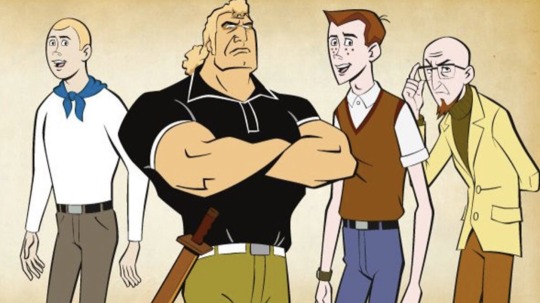
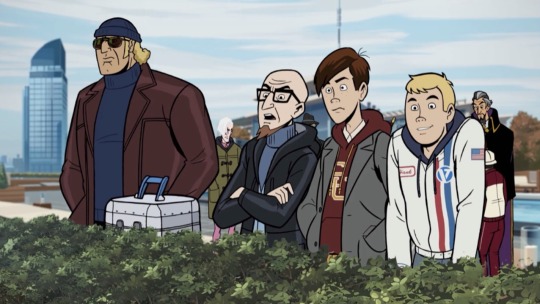
This at least appeals to me because you can keep the show’s status quo, keep the characters together, and have them grow into better more interesting characters as opposed to starting with a dour world where everyone is dead or just worse insufferable people. Instead, begin where audiences are comfortable and open to a new interpretation then let the characters realize there’s more to life and explore what kind of people they can become. (Or just don’t do it.)
Also just hear me out, but maybe, possibly? perhaps the professor was a good dad in the original cartoon? And let’s keep that? Let him remain a wholesome father figure? Is that okay? Don’t make this reboot? But if they do, keep him a nice loving parent?
Since this is the CW/ Warner bros who own DC comics, the best case scenario (cancelled) would be to make it more like the MANY SUPERHERO SHOWS THEY ALREADY MAKE. The good ones, anyway. I’m pretty sure the girls have crossed over with some DC characters in the cartoon already, why not make them canon DC characters? Maybe not. Could be cool! Better not, though. But they could still model the show after some of their better shows. Flash, Arrow, Supergirl are all not bad depending who you ask. I just finished Gotham, that was neat. Superman and Lois sounds like it’s pretty good so far. Powerpuff girls would better suit an earnest, straightforward, lighthearted take. Keep the humor, idk maybe up the violence to keep it dark and cool if that’s what people want (we don’t) and have it contrast with family drama like Invincible. All that to say that a darker, comical, well-written, DC-ish superhero thing they should look to for reference should be Doom Patrol.
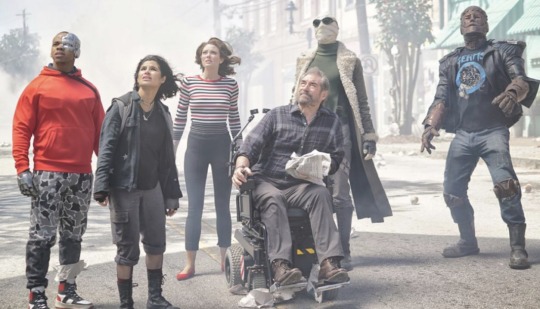
This show fuckin litty. It’s like the better parts of Legends of Tommorow and Titans put together, as in it’s super weird and dumb but in a way that’s fun and moving. I recently rewatched season one as refresher before getting into season two and dammit if it didn’t get me in my feels amidst the quarantine. It’s about broken people working through their issues and pulling themselves together to help one another. Admittedly, it doesn’t have the best representation of those with disassociative identity disorder, as one character sometimes referred to as “Crazy” Jane has a different superpower with each of her alters. The character is very much a product of the 80’s but the writers of the show do their best to show that Jane respects the alters and their free will. But it also deals with topics of abuse, self-image, trauma, disabilities, homophobia, discrimination, and more in a way that gave me some catharsis while watching after all that’s been going on the past couple of years. Aside from all the comedy and action, it all flows together naturally, which is what you want in any series, not just your gritty superhero show. Doom Patrol is also batshit weird, every episode feels almost self contained/ freak-of-the-week while still following the main overarching plot, and Powerpuff Girls is very much like that, without the bigger plot or mature themes (as it should remain, let it be). Many will find it vaguely similar to The Umbrella Academy because GERARD WAY WAS INSPIRED BY DOOM PATROL TO WRITE THE UMBRELLA ACADEMY. The og comics, not the show, but still.
Also let’s address this

The hell was this about?
Anyway Idk maybe I sound like “Old Man Yells at Cloud,” but this really isn’t the way to go. Don’t do it, CW. Leave it alone, CW. Just don’t do it. We don’t need more sequels and reboot cash grabs, there’s plenty of up and coming writers with good original ideas waiting for their shot. And even with all those new edgy shows and movies, some of which are actually not bad, not everything needs to be so grim. Like sure Teen Titans Go! is a goofy reboot but it’s still just a fun dumb cartoon, it’s not bad, I bet that other ppg show was also just fine. Maybe YOU are “Old Man Yells at Cloud.” But what do I know?
And all THAT to say you should go watch all those other things I mentioned and some old ppg episodes back to back, instead. Don’t fuckin do it, CW
#powerpuff girls#powerpuff cw#powerpuff bubbles#powerpuff blossom#powerpuff buttercup#the cw#samurai jack#invincible#the umbrella academy#venture bros#doom patrol#dc#gorillaz#more nerd shit#long post#umbrella academy#don’t do it
174 notes
·
View notes
Note
I think rock lock was used to show that the spinner cult is fanatic and self centered and he might even school them or have some flashback. But it’s still so weird to use the guy whose race is the original allegory for mutants in the x-men 😓
I certainly hope that's what Hori will do with him, but I kind of doubt that. The entire subplot has been handled poorly and given Hori's need to reference pop culture (he used Star Wars refences to name his fictional genocides for fucks sake) I think it's not unfair to assume he just pulled it out of X-Men whole cloth without actually caring about why the OG material had it in the first place.
If Hori doesn't address it and presents Rock-Lock as the same as any of the other 'human shaped' non-mutants, I do think that proves how little he actually cared about presenting this theme. Frankly, he's already steered into sort of offensive territory already, presenting the mutants as joining the PLF/Spinner and wanting to kill everyone. Heck, Spinner's entire reason for joining the LoV being because he was cosplaying Stain and didn't have any beliefs is kind of stupid if he already has a valid reason to be mad at society and want it changed.
And at the end of the day, this is a side plot. I've seen people annoyed with others who find this chapter boring, claiming they just don't get the story or only want their favs and flashy fights. But I don't think the people who say this chapter isn't important are wrong. Mutant discrimination isn't integrated into the main plot at all and is barely focused on even when we're following mutant characters. Sure this chapter brings up big world building things (out of no where), but at the end of the day I don't see this effecting anyone but side characters involved.
This isn't like Full Metal Alchemist. It had it's issues, but at least Scar and the Ishvalan genocide were integral to the main plot. Yes, Ed and Al wanted their bodies back and that was their main drive, but that desire led them to the philosophers stone, which led them to uncover how it was made and used in Ishval. That discovery helped lead them to Father and how the Homunculi were controlling their country and had set up Ishval for slaughter on purpose. Characters like Riza and Roy were haunted by what they did and their main motivations were changing the country so no more genocides happened.
Arakawa cared for this plot. She wove it and Scar into the main story in a way where they can't be cut out of it without changing the entire thing. It's something that impacted almost all of her characters including Ed and Al.
Hori just hasn't put that much care into his own story. The mutant discrimination stuff could be cut and it wouldn't really change all that much. It already wasn't a major part of Spinner's character--he could have just been bullied because he was poor or something. The people fighting for him could all just be PLF goons that escaped during the first war. It doesn't impact Izuku or Shigaraki; didn't change their outlook on the world or challenge them.
It's a set dressing, something that Hori pulled from a different comic to deepen his world building and make a cool side plot with his fun animal/ non-human character designs. It feels shallow and unimportant. Putting the stand in, right next to it's RL counterpart and having them insist he can't understand their oppression is just proof that Hori hasn't given this part of his story as much care as it needed. So, yeah, I can see why people find it boring.
#ask#thanks for the ask!! :)#bnha#mha#bnha spoilers#bnha critical#im still a little shocked he had a random character exposition dumb two cases of mutant genocide or mass murder#like that shit should is huge#that's not something you have a rando tell the audience 370 chapters into your story#that's like if for some reason in the final arc some random Ishval told us about the genocide#instead of scar or Miles or Riza or Roy or Marco or literally anyone important who would have an actual character motivation to tell us#seriously why didn't any of these other mutant characters know about these huge events#oh yeah because Hori made them up probably just a few weeks before he wrote the chapter :/
6 notes
·
View notes
Text
George A. Romero’s “The Amusement Park”
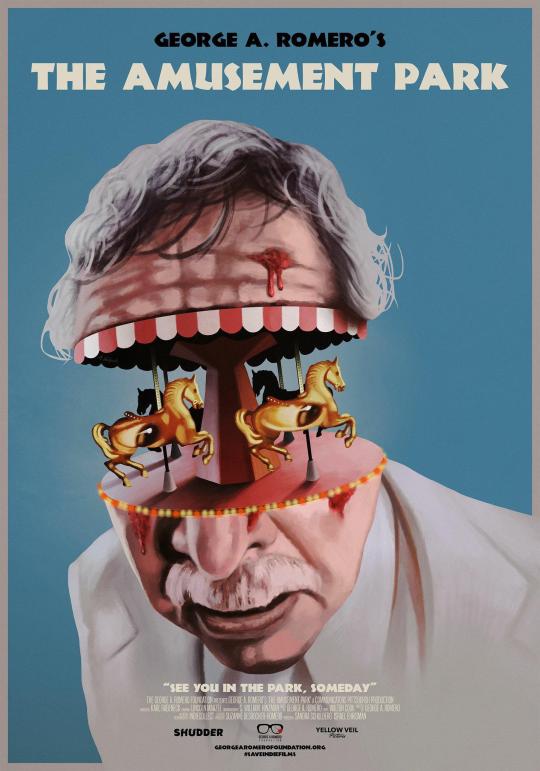
George A. Romero might be the man who most directly served as my gateway to critical movie watching. Unlike a lot of the filmmakers who helped me mature my understanding of film as a medium of art rather than a disposable experience, my love for his work has only deepened as opposed to having a twinge of cringe at the pretense with which I embraced some movies and directors that I’ve grown cold on or outright pivoted into disliking. Where, for the latter, they served a valuable purpose but were perhaps able to do so as a result of being digestible or, in retrospect, lamentably simple, Romero’s movies have not a single thread of posturing to something “important” woven in. Romero was always handy in using the backdoor of theme and metaphor to deliver ideas, as opposed to a direct scolding or information session.
At their very best, his movies achieve a balance that few films can when it comes to being experienced as being equally enjoyable and intellectual - while never sacrificing one for the other. There’s almost an elegance to the inelegance that comes from working so far outside of the studio system. The low budgets of his independent fare give a scrappy, tactile quality to locations and do little to glamorize and gussy up things like frequent collaborator Tom Savini’s chunky, visceral makeup effects. His run in the 70s is especially potent as a result of the low-budget aesthetic. The Crazies, Martin, and Knightriders would lose a certain verisimilitude to their outsider art mission statements if they had a glossy studio packaging.
I’ve been hesitant to write up my love for the late, great Romero since it feels like a daunting task to distill the endless rivers that flow from the massive glacial totem that is George A. Romero. The same thing can be said for a lot of people whose work I have deeply seeded respect and love for like Jonathan Demme or Robert Altman. I know that art and movies are reduced when treated like rites of passage or items on a checklist for credibility, but I have this overwhelming feeling that I want to come correct when it comes to folks like these. It feels like a responsibility to be comprehensive, eloquent, and effective in describing them, their work, or their massive impact on myself.
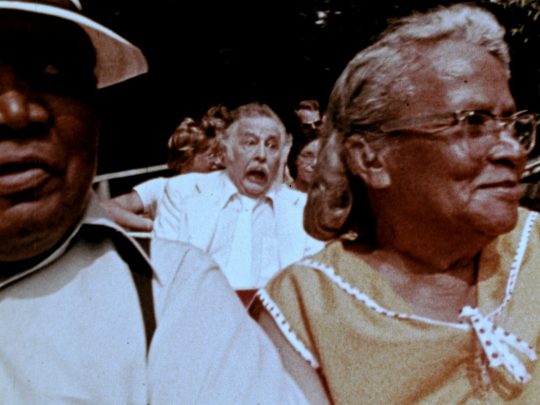
Well, I finally got enough reason to put down some words when I found out that a bizarre, long-thought-lost missing puzzle piece of this titanic personal hero was going to be released. Not only that, but I could see it in a relatively safe way in a theater. What I was lucky enough to see projected on a bright wall in a dark room was something that filled me with equal parts pleasure and stomach-churning uneasiness. One of the greatest compliments I can give to the film is that felt like it would make a terrific pairing with Carnival of Souls.
The Amusement Park is a film that Romero was commissioned to make by The Lutheran Society about senior citizens being disregarded by society. After having seen what Romero concocted up with screenwriter Wally Cook, it’s no surprise that the film was shelved, and thought destroyed. Like all of Romero’s great films, The Amusement Park operates with a keen but unpretentious metaphor and allegory at its heart. What makes this project immediately different is that it’s bookended with a direct address to the camera from its star, a charming and hammy Lincoln Maazel, breaking down the mission statement and intent of the symbolism within it. What follows is an experiential concept piece that disorients the viewer in an attempt to have them empathize with their elders’ terror and loneliness at the hands of ageism, elder abuse, and death. It’s an effective plea for human decency and a disquieting, haunted trip to hell outside of heaven’s waiting room.
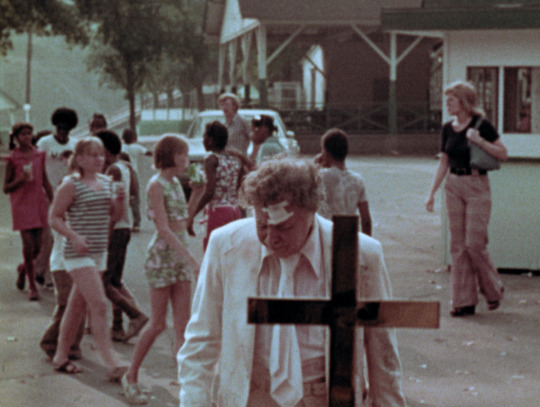
The runtime is under an hour and plot takes a back seat to sensation, so I won’t go into too much detail for the sake of preserving the set pieces’ potency. What I will do is highlight a few moments and stylistic choices.
The Amusement Park is very angry and very sad. The camera is mostly handheld and takes on a documentary texture when it focuses on the faces of other elderly park goers. There’s a lament for the life that these poor folks are trapped within cut between a venomous glare at the ancillary characters who disregard or assault the senior park guests. Romero’s usual distaste for the wealthy resurfaces most notably in a scene where Maazel’s man sees a rich and “proper” man dine on lobster and smoke a comically large cigar before looking back at the old man in absolute disgust. He’s served a slop of beans and bread on a paper plate. Like a lot of the film’s ideas, the dichotomy of circumstances trades subtlety for effectiveness. What makes this scene unique is that when the old man offers to share his meager rations with the other hungry guests, they show no restraint – it’s a nasty collage of shots with bread being torn and people shoved.
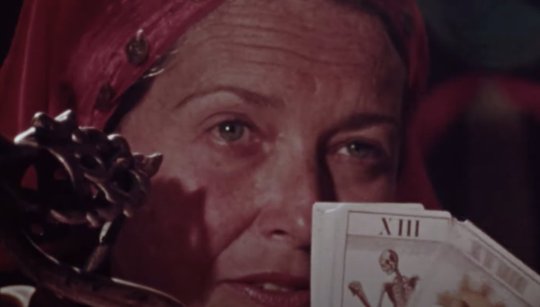
The real standout sequence comes as our unnamed protagonist follows a young couple into a fortune teller’s tent while they ask to see their future. The spritely lovebirds want to know if they’ll be still be together in their old age, but the fortune teller offers warning that in order to see their future, they’ll need to see it in its entirety. The couple’s youthful ignorance shows a general feeling of invincibility that many of the young characters have throughout the film, but once they see what the soothsayer has to offer, they are forced to reckon with the ominous vicissitudes that appear before them.
The editing of the sequence is jarring, cutting between the disparate time periods – flash cuts between the crystal ball and the eyes of the woman behind it are slammed into what looks like a documentary or news interview with a building manager who laments the raise in taxes and how it keeps him from fixing the dangerous, dilapidated, low-rent housing behind him. This is an institutional crisis. The film cuts to narrative footage of that same young couple, now old and desperate for emergency medical attention. Outside, a high school marching band blares and trots forward with a brash, spry pace. It’s as if the band is flippantly taunting the old women, life trampling on without her and her bedridden husband. The wife’s attempts to reach their doctor are moot. Chaos overwhelms a quiet passing. Upon seeing his own mortality, the young man targets the protagonist and attacks him in a flurry of confused anger.
The movie has an episodic structure, and some of these interludes work better than others. While I do think that the movie is quite good and a must-see for any curious fans of the director’s career (he even has a great cameo), I certainly wouldn’t hail it as a masterpiece. Working for hire within the specific constraints of an educational film and off of a script that he didn’t write (a rarity within his career), there’s some serious clumsiness to the some of the story beats and how underlined the symbolism is. I also greatly missed the seamless integration gallows humor that spices up even the bleakest of Romero’s other projects. What’s here in terms of levity occasionally undercuts the horror. That being said, its mission to imbue experiential empathy for old folks was undeniably successful in this viewer - the packaging may be a bit busted, but the product is fresh and satisfying. Like The Crazies or his Dead films, the ever-approaching specter of death is the driving force behind the melancholic terrors of the piece. Romero’s knack for satisfying but somber endings is present here as well. Images from this - like the holy men closing up shop - stack up alongside some of the other hauntingly effective moments from Romero’s movies that are emblazoned in my brain like the closing montage of Night of the Living Dead, the opening sequence of Martin, the roaches in Creepshow, and the wall of hands from Day of the Dead.
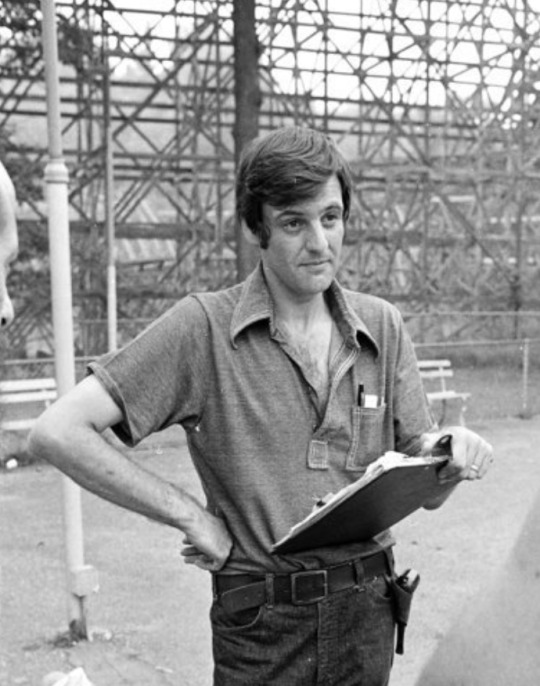
While it feels weird to offer praise to a man alongside a short review for a movie he was, by all accounts, not terribly impressed with, this is what I’ve chosen to do. *shrugs* I’ll never write the perfect tribute or quite distill the gratitude I have for certain people and the gifts they gave me (along with countless others). I can selfishly make that a burden and never actually put it out there for fear of imperfection, or I can be grateful and embrace the luck that I’ve been able to see another work from one of those people. Especially after watching this, I’ll choose the latter.
The Amusement Park is now available to stream on Shudder.
3 notes
·
View notes
Text
I mean...
Before we go on, my qualifications here are that I myself am not myself ace but I am bi and have been close friends with several ace people over the past decade-ish, so I do not have any personal orientation-related stakes in this. (I will say for honesty's sake that I had a strong sense of Nightingale being ace well before this, though.) I also really hesitated because you've done me a solid before and I generally enjoy your stuff in the tag, but this really stuck in my craw.
So. First off, although this is absolutely the least important bit, I personally absolutely do not see this as some sort of competition that Team Ace won. I consider this an "a rising tide lifts all boats" kind of thing. If any one of us queer folks scores a win, especially one of the less publicised subcategories, we all do. So from that perspective, although I understand why you might be disappointed and you're entirely within your right to feel that way, I do not see it that way myself.
So with that said, onwards to authorial intent. So we know from the very first book that Peter basically clocks Nightingale as Straightn't, immediately following up his assessment of Nightingale's appearance with "All he needed was a slightly ethnic younger boyfriend and I’d have had to call the cliché police." Generally, over the course of the books, we can trust Peter's assessment of things. He correctly clocks that the way "Varenka" deliberately avoids giving a surname is suspicious many chapters before she goes on the run after the death of Albert Woodville-Gentle and a book before she turns out to be on the run from the Russian government, for example. So at minimum, we can infer that Nightingale was always meant to be Some Flavor Of Queer, whether it was gay or not.
I really, really doubt that cis, het man in his… more than early middle-age (who, let me remind you, about just ten years ago, in book 2, made Peter feel wary of the gay-jazzman and Ash's trans date) could understand the concept to the degree that would allow him to grace us with an adequate representation.
I have... many issues with this bit, I will admit. For one, even middle-aged cishet guys can be allies and/or want to accurately represent the full scope of human diversity. Terry Pratchett turned his dwarfs into queer/trans allegories in the 90s. Yes, Ben is a (presumably? I don't know if he came out about anything) cishet guy who fumbles his queer stuff. But I get the sense that he really does try, and I personally feel that cishet authors trying is leagues better than desperately staying away from queer people as a subject because they consider us more alien to write than like... actual aliens and fey.
While I do agree Ben fumbled his handling of queer issues in earlier books (although I disagree with your examples--David the jazzman eyeing Peter at a barbjust makes him uncomfortable but he doesn't treat him any different, as with Ash's date, where Peter is just politely confused and it's useless-layabout-making-the-hostel-staff-miserable Ash who actively misgenders his date), it's also worth noting that he does take criticism to heart and genuinely try to do better. Stephanopoulos got a much more sympathetic treatment after her lesbianism is mainly played for one joke in book one, for example, especially in the comics where we're seen part of he morning routine with her wife. He also reached out on Twitter in 2016 to ask his gay followers what info and advice would have been available to them circa 2001 for research, for another example, and in book six, Peter is extremely sympathetic to what he imagines of Caroline Linden-Limmer's experience growing up as a trans girl ("I thought of the little girl in the blue dress--you can't get a [Gender Recognition] certificate until you're 18--it must have felt like a long wait."), with Nightingale being explicitly "outraged" at the concept of a gender recognition certificate not because he's against trans people but because he seems to be against the idea of having to appeal to a panel to prove it.
And finally: not to be a jerk, I genuinely tried to work out a less confrontational way of saying this, but... wanting a contrast between a character's inner workings and their external facade is your personal preference for characters. It's not any kind of hard rule. But even then, Nightingale has a very clear conflict between his facade and inner workings throughout the books: trying to be the person the remainder of magical Britain can look up to despite severe PTSD from the war ("The chaps have always needed to set me on a plinth this way. I can see it in their eyes. If the Nightingale can take it so can I, they say and who am I to disabuse them or tell them of the nights I have spent pleading with the spirits for some peace." from Tales From The Folly, "could a mentally ill person do this?"-meme with Nightingale gesturing to the two thousand, three hundred and ninety-six names he personally hand-carved into the walls of Casterbrook, his recurring nightmares about the Battle of Ettersburg with the dead pleading with him to just let them go and move on from the "Under Kite Hill" short in 2016) and trying to come to terms with the fact that he's a dinosaur unsuited to modern policing who allowed several Ethically Challenged Magicians to sprout up right under his nose because he couldn't keep up. Internal conflict can arise from different emotions than love or lust.
I'm not your dad and I'm not the police. I'm not going to bust down your door and confiscate your computer because you read a fic about Nightingale kissing someone. You do you, whatever. But I do find it extremely frustrating that I went into the tag with a rhetorical question meant as a "Hey guys holy shit this is cool" because I have several ace friends who basically never get any sort of representation, good or bad (to the point where a friend dropped this post in a mutual discord server to @ an ace mutual friend even though she has zero interest in the books just to go "Hey look he's ace too!"), and you spent most of your post going "lol canon sucks this doesn't matter it was just for diversity points". Even if it doesn't happen to matter to you, it matters to other people, and I think it's rude to shit all over that.

Rivers of London fans, how are we doing in the wake of Nightingale being canonically asexual?
#rivers of london#the masquerades of spring#spoilers#masquerades of spring spoilers#rivers of london spoilers#asexuality#long post
176 notes
·
View notes
Text
hey this has officially gone too far
this is now crazy. ive tried to resolve things quietly with the people involved. but whilst that’s been happening, the situation has really spun out of control (thanks to a loud and ignorant few people) and i havent had the opportunity to defend myself in all this.
first of all, my initial statements weren’t actually controversial. i, and a few other tumblr users (including @dykemas) made posts reminding christian, and atheist westerners, that depicting canon non-christian characters in christmas art was insensitive and offensive to people of those faiths. i made this post as a jewish woman, because it’s inappropriate, and sometimes even disallowed by our faiths.
christmas is not a neutral holiday. it is religious. although american atheists want it to just be a fun holiday tradition, it isnt. and i didnt think it was appropriate to be drawing damian in a santa hat, considering this is old discourse that we went over last year. its alarming to me how quick everyone is to strip him of any religiosity. yes i am aware that arab =/= muslim, and i never said that. it’s pretty widely accepted that he’s a muslim character, considering that talia canonically is. if we want to say for arguments sake that he isn’t then, it’s still unlikely he would be celebrating christmas, and assimilating into christian tradition, when his wider family is jewish.
bruce wayne and dick grayson were created by jewish writers. they were crafted in the great tradition of jewish story telling, as allegories for biblical characters, with jewish speech patterns, and takes on morality and ethics, to subvert white supremacist overtones in wider american media. dc has even, as recently as a few months ago, confirmed that bruce wayne is a jew. this wasnt explicitly confirmed early on, due to the comics code authority being really antisemitic. by the time the authority was overturned, dc was uncomfortable with how overly jewish these characters were, since american society was still uncomfortable with judaism and it’s role in comics’ history, and they knew it would hurt sales. that’s why we see the batfamily in canon celebrating christmas. this is inappropriate.
martha wayne was a jewish woman. bruce’s wider family is jewish. the family is jewish. tim drake was created by a jewish writer, with the intention of being jewish. this family. is jewish.
there’s a reason that jews dont celebrate christmas: because we have our own faith and tradition. and it is insulting to have that brushed away by ignorant and rude people. no jews and muslims dont celebrate christmas. muslims are not allowed to celebrate christmas, since it has roots in paganism. jews arent allowed to celebrate christmas, since it celebrates jesus and we dont view him as a prophet. he’s akin to another g-d and we only. have. one. g-d.
and erasing a character’s non-christian religion is disgusting, especially in the case of judaism. after the shoah the catholic church rounded up jewish children from camps and refused to return them to their families. they instead continued the nazi’s genocide, by stripping them of their faith and language and forcing them to adopt catholicism. so by stripping a jew’s faith, and saying ‘oh he just culturally celebrates christmas’ is really disgusting. because there is a history here that christians just dont understand, and obviously refuse to learn.
so yeah. i will continue to back my self and my convictions. it is inappropriate to dismiss my concerns about respecting the religiousity of these characters. and it is disgusting to watch you disrespect the intentions of these characters’ jewish creators. as christians/americans with christian backgrounds, you do not get to tell a jew how to view their holidays and traditions, and it is beyond disgusting the way this debate has been depicted.
it is not hard to be respectful of non-christian people at this time of year, and it is really not hard to learn about comic history. it’s widely known that comics are a jewish art form. when making art around this time of year, there is no need to specifically offend jewish and muslim people. there is no excuse at this point. get informed.
446 notes
·
View notes
Text
“I let them in and they broke me” The Worldview of Batman: Last Knight on Earth
Batman: Last Knight on Earth, from DC Comics' "mature readers" imprint Black Label, is supposedly the final word on Batman from the team of writer Scott Snyder and artist Greg Capullo, who have worked together on the character in some capacity since 2011's New 52 relaunch. This claim to finality isn't entirely convincing given that Snyder and Capullo's current Death Metal event series is also about a Batman and his friends fighting a bunch of evil Batmen, but for the sake of this examination, I take Last Knight on Earth at its word. As an experience, as a comic, Last Knight on Earth (hereafter LKoE) is really good. Snyder and Capullo are both heavily invested in the character and they're firing on all cylinders here, throwing out off the wall ideas which would never fly in the mainstream DC Universe and giving us lovingly rendered, absolutely beautiful pages of devastation and violence. It's a feast and a thrill ride, but it's also not going to be for everyone because it is deeply, deeply misanthropic in its politics. LKoE, more than anything else, is about disappointment in humanity, but where it goes with that disappointment is fundamentally conservative and nostalgic.
To understand this, it's important to know that Snyder's take on Batman has always been grounded in post-9/11, post-War on Terror urban fears. Batman had long been rooted in the urban fears of the 1980's; crime run amok, overwhelmed and inadequate police, etc, thanks to the influence of Frank Miller, a man who was famously mugged multiple times after moving to New York City and wasn't shy about reflecting that feeling of helplessness and anger in his work. Snyder's Batman, by contrast, was not a terrifying spirit of vengeance, but a shining beacon, a folk hero and aspirational figure, Snyder's Batman is heavily informed by the Obama era. LKoE is about this Obama era optimism, naivete if you like, crashing against the reality of the 2016 election of Donald Trump. It's not subtle in its allegory; the apocalypse of LKoE is set off by Lex Luthor and Superman having a debate about good versus evil and the people of Earth democratically "voting" in favor of evil, then rising up and destroying the world. They even come into the halls of power, or rather JLA HQ, the Hall of Justice, and destroy the very people who tried to protect them. The horror at the heart of the book isn't Trump, it's the idea that people are horrible, stupid, and selfish.
It's unrepentant in this misanthropy, but also noncommittal. For a book about how bad ordinary people can be, there are shockingly few of them in this book. There's no Carrie Kelly, no Harper Row (Snyder's own creation, who even he has evidently forgotten about) in this book, no one to push back against the idea that people in general are bad. There is no mention, no glimpse of those who didn't want this, who "voted" for goodness, the election condemns them all, renders humanity as a whole into a monolith of ravenous, mindless evil. The closest we get to confronting this monolith is the Slingers, ordinary humans who tried to use Green Lantern rings, and because they lacked the will to control them properly, have become giant, mindless, evil, energy babies. It's an evocative and amusing image, but the politics of it are distasteful: "This is you." says LKoE, a big baby, totally unprepared for a power which should only be placed in the hands of the chosen elite. One (1) single ordinary person gets to speak in this book; a toe-headed little boy who talks to Batman for just over a page, little more than a cardboard cutout, that's it. For a book that's about humanity's evil, LKoE is completely unwilling to look that evil in the eye.
The final enemy that Batman must confront isn't a Trump analog, it's not even humanity's selfishness as a whole, it's Omega, and who is Omega? Batman, but broken. Omega is the original Bruce Wayne, tortured and mutilated in the aftermath of the "election" as humanity descended into an orgy of self-destruction and violence, now having pieced himself back together as a totalitarian, mind-controlling villain who wants to protect humanity from itself. He could, charitably, read as the rise of fascism in light of chaos, the fear of the guy who comes after Trump, the cleaner, more articulate monster who can really get things done (though such a fear already seems outdated given Trump's efficacy in perpetrating horrors), but I think that misses that mark. Omega is Batman as a blackpilled doomer, someone who has looked into the face of what humanity is capable of and given form to his misanthropy. Our Batman, the hero of the story, is a clone of this fallen Batman, with matching memories that stop just short of the "election" and his fall from grace. He's the same guy in every way that matters, the only difference is that he was never traumatized, he never really reckoned with what humanity was capable of: he was never a victim. Our Batman is a hero because of his ignorance, because he's been allowed to forget, and in doing so his underlying assumptions about the world have never been challenged. LKoE is a book in which even the Joker can earn redemption and a place in the extended Bat-family, but Omega has to die by the hand of our shiny, unblemished Batman so that the future can live. And what is that future? It's more of the same.
LKoE ends with an almost sickly sweet scene that looks a lot like hope: the heroes all hug each other and strike a group pose looking hopefully at nothing in particular, Batman holds a baby version of Superman and resolves to raise him and bring hope back into the world, but none of it really means anything. It's more of the same, the same people doing the same things, led by a man whose defining virtue is his ignorance of the past, a group of insular elites watching over a people they both hate and fear, doing nothing to make people better beyond hoping, vaguely, that they won't make the same mistakes again. There is no passing of the torch, no new Batman for a new era, it is pointedly, specifically, the same old Batman. LKoE is a comic that's ultimately about staying the course, doing the same thing despite knowing that it means nothing, acknowledging a fundamental contempt for the unwashed masses but not actually doing anything about it because hey, it's not like you got hurt. The bad guy is the one who won't let go of the past, who points at what people are capable of and demands change, and he can't be allowed to exist if we're to get back to doing things the old-fashioned way.
Last Knight on Earth is motivated by the birth of the Trump era, and arrives as it nears a potential finish, but it doesn't point towards anything new, it just wants to go back to the way things were, even in the face of an unshakable hatred of people and a certainty that they are not to be trusted, that they need their betters to guide them. I don't want to be so thuddingly simplistic as to label what these means politically, but laid out like this it's clear. The ideology of Snyder and Capullo's Batman is born of the Obama era, warts and all, and cannot survive the Trump era, but the solution Last Knight on Earth offers is not to change and evolve once more, but to forget, to fall back. That doesn't work, it can't work, whether it's a comic book or the real world, history only ever goes one way.
21 notes
·
View notes
Text
30 Days of the Dark Crystal Challenge
Decided to do poultry-blocks Dark Crystal challenge because it looks like a lot of fun to do. However I’m cheating and I wrote all of this within a couple of days. Warning: fairly large post with pictures and fan ramblings.
EDIT: I FORGOT TO INCLUDE DAY 16 WHOOP. It’s in there now.
Day 1. Your favorite skeksis
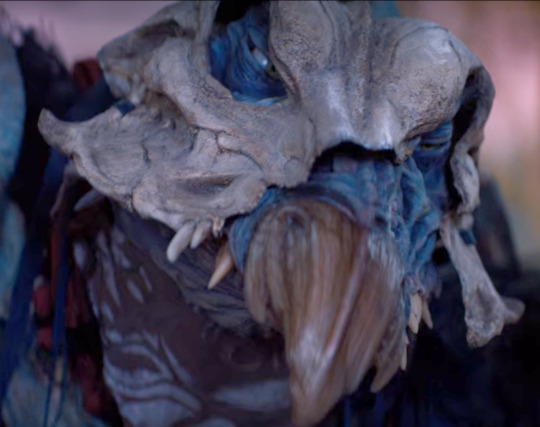
Idiot, feral, wildman who stole my heart. How? Why? Who knows. *chef kisses* Beautiful stinky bastard.
Day 2: Your favorite gelfling
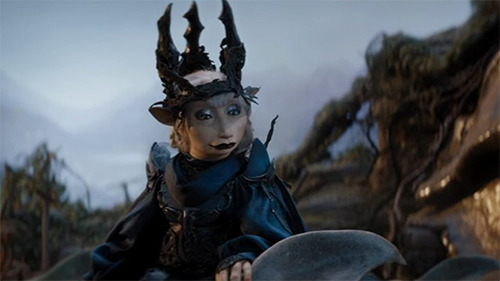
Bless her and her skeksis cosplay. What a queen.
Day 3: A character that you love that everyone seems to hate.
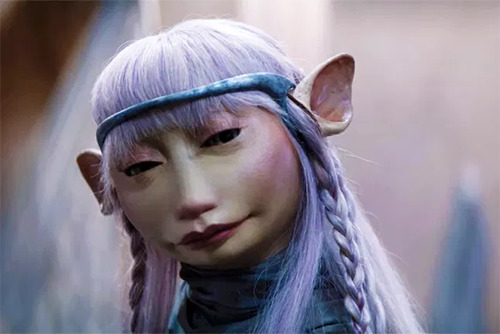
The tides are changing for her it seems. I think people are appreciating her more, but she still faces her fair share of controversies. Not that I don’t think it warrants discussion nor am I excusing her actions. But she’s way more complex than what a lot of people are making her out to be.
Day 4: A character that you hate that everyone seems to love.
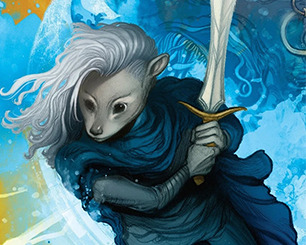
Hate is a strong word as I don’t hate him, but I don’t really care for Amri. He feels like a bootleg Deet mixed with a little bit of Kylan and Gurjin. Wasted potential and honestly shouldn’t have been the POV for Tides of the Dark Crystal. Seems I’m alone in this opinion, though. Maybe the book warrants rereading?
Day 5: Movie or TV Show? Why?
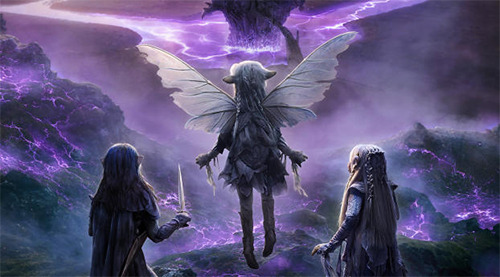
TV Show by miles! I think the series accomplishes way more than the movie does, like establishing lore, better written characters, and a more engaging story. I actually cared about the gelfling and it really fleshed out the skeksis in an interesting way outside of “oh they do evil things because they’re evil!”. Doesn’t mean it does everything right, but I’ll get into that later.
Day 6: Something you wish that happened in the series but didn’t.
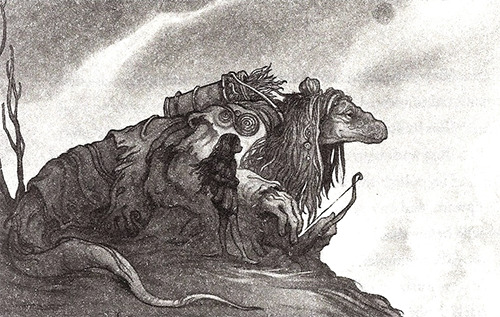
Just a few things. I miss the gelfling intermingling with the mystics, particularly urVa. I love everything that happens with urGoh and skekGra, but some of the bonding moments Naia had with urVa are precious and I wish we had more of that. I also wished the gelfling got the message out to the other clans like they did in the book where Kylan dreametched their message onto the Santuary Tree’s blossoms and scattered them all throughout Thra. I also wished Tavra and Onica were an established couple, but maybe it’s not too late for that.
Day 7: Favorite gelfling clan
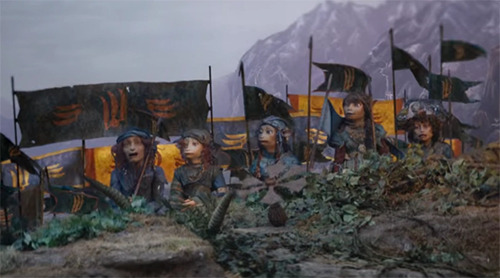
The Sifa! It was the Dousan at first, but the more I learned about the Sifa the more I grew to love the clan. If I were a gelfling I would probably be a sifa myself LOL.
Day 8: You opinion on Aughra
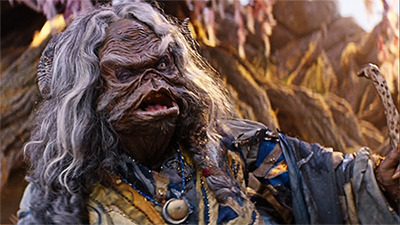
She’s a fun and fascinating character! Aughra puts a unique spin on the whole beautiful, wise earth goddess trope by making her ugly, old, and cranky. She’s also a character with her own flaws, even having a mini arc about neglecting to take care of her planet and doing whatever she can to make amends. Not to mention she’s wildly entertaining. Much love for Aughra!
Day 9: Skeksis or Gelfling?
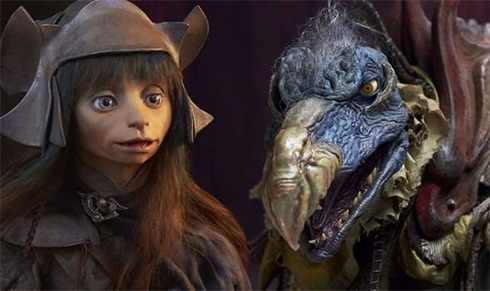
Both!
Day 10: Your opinion on podlings?
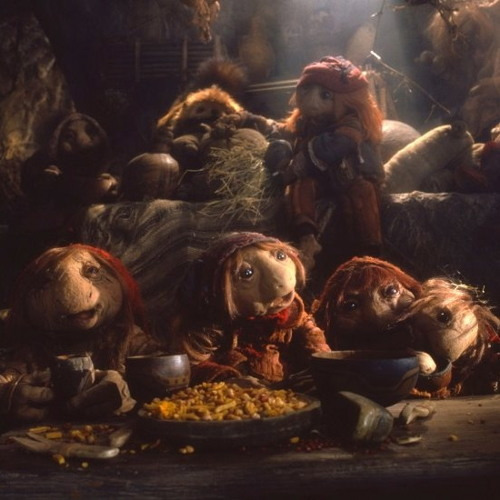
They’re just funky little potato people who just want to have fun, dance, and drink all day and I respect them for that. They’re great. Also Hup exists and he’s just an amazing character so there’s that.
Day 11: Your The Dark Crystal unpopular opinion
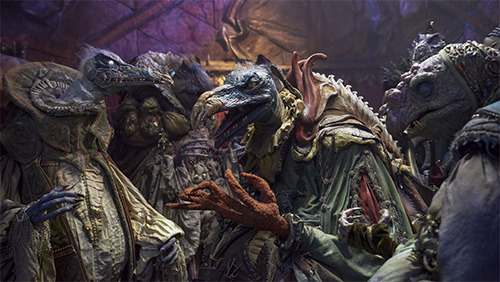
I think it’s okay to sympathize with the skeksis as long as one is not excusing their actions. I see a lot of people say you shouldn’t because they’re evil and they commit atrocities. Which, yes, it’s true, but I think both can co-exist. I mean, skekTek’s whole cycle of abuse is written very sympathetically yet the show doesn’t coddle him. It shows the ugliness of his character and what happens when someone isn’t capable of cutting off from said cycle. Also the writers consider the skeksis as tragic characters due to their broken nature so I don’t think it’s wrong to be a little sympathetic. But once again with great emphasis, sympathy is fine as long as their actions are judged. They are awful bastards and no amount of sympathy will change that.
Day 12: Something you dislike about the series
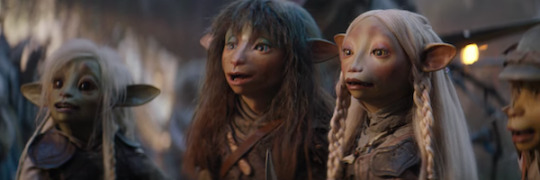
I think the stuff I don’t like about the show is a result of its pacing and cluttered cast. There are so many stories going on and while I liked how they handled it for the most part, you can also see how the show rushes to get through all of them. A lot of important moments where a character should reflect or something that should simmer more is pushed aside for the next thing. Maybe if the show was given more episodes and time to breath it would have been better off.
Day 13: Most disappointing thing about the series
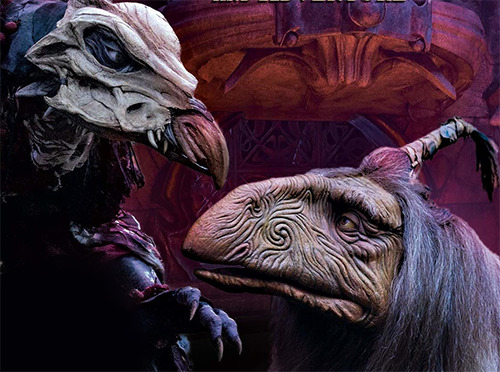
SkekMal and urVa didn’t have enough screen time and we were honestly ROBBED.
Day 14: Your OTP
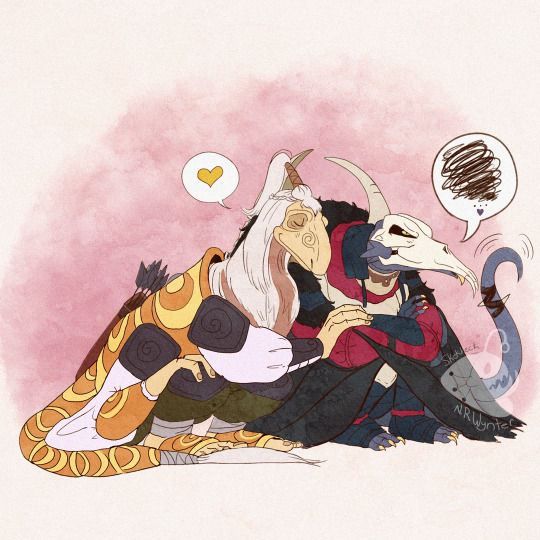
Speaking of which... . Its a crack ship, but I’m all about that allegory for self love (and I just want these two to be alive). Day 15: Favorite quote
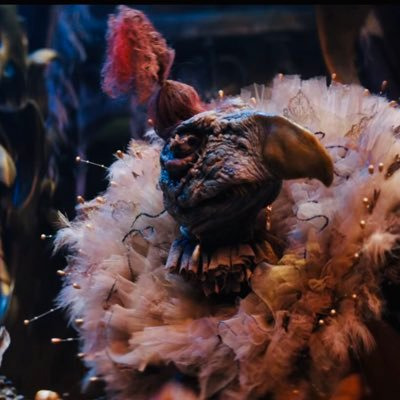
Listed plenty of my favorite quotes before, but I’ll pick this one:
“ Life is my paint. Death is my canvas”
Day 16: Rate the skeksis from least favorite to favorite OR rate the gelfling from lest favorite to favorite [or both!]
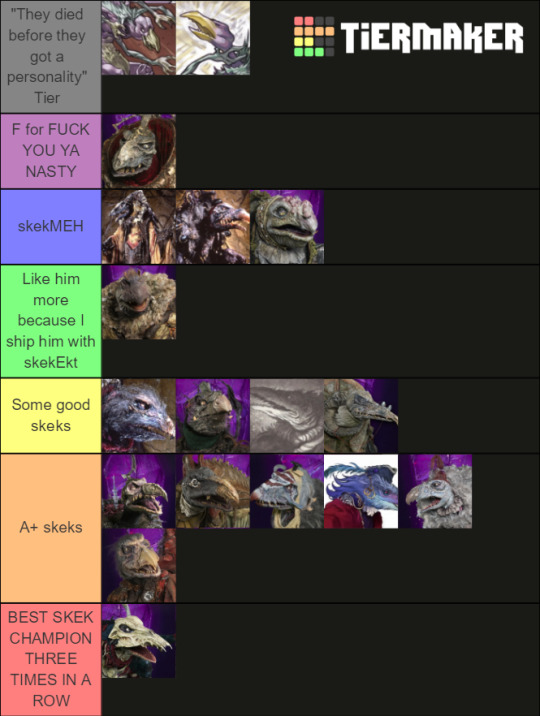
And if you want my gelfling hot takes, here’s this list (just backwards in context to this post)
Day 17: Opinion on Raunip?
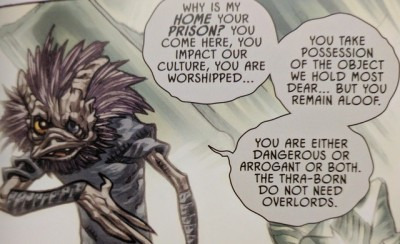
Raunip is a fantastic character. I loved him in Creation Myths and I can’t wait to see what role he’d play in the resistance. And I absolutely love the parallels between him and the urskeks it’s great.
Day 18: A character that is most similar to you.
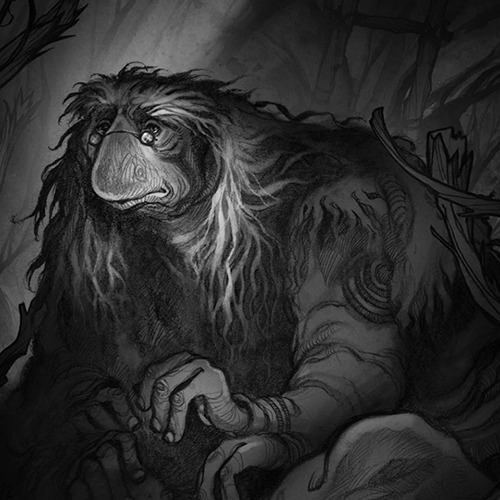
I too am a dark-dwelling gremlin who constantly forgets where I put things and crack a few dark jokes at my expense.
Day 19: Which character do you strongly dislike, why?
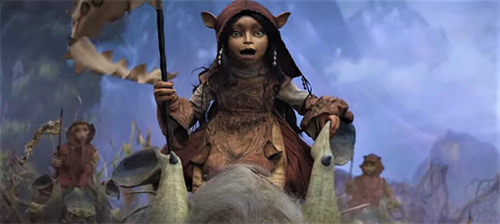
This is entirely based on the books, but I find Mera to be awful. I think it’s because she’s so fake and condescending? When Naia arrived in Sami Thicket, she was acting nice and polite but when the Drenchen asked her why the skeksis never visited Sog Mera responded “It’s only worth counting what’s valuable”. She continuously disrespects her by calling her pet names even when Naia became maudra. It doesn’t come off as cute, it’s gross. I don’t recall Mera ever apologizing for any of the shit she did to Naia... or Kylan for that matter. She was a pretty neglectful step-mother to him. She doesn’t have an excuse being busy with Maudra stuff because Laesid was a kickass mom to her kids. So in conclusion, fuck this bitch.
Day 20: What do you like so much about the Dark Crystal?
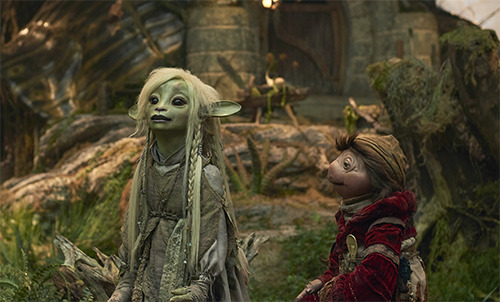
The better question what’s not to love about the Dark Crystal? It has amazing creature design, an expansive world that feels real and alien from our own, having complex and interesting characters as well as villains, the fact that it relies heavily on practical effects a.k.a puppetry... . There’s nothing like it and that’s what makes it so wonderful and unique. It needs to be appreciated more.
Day 21: Favorite music piece from the soundtrack?
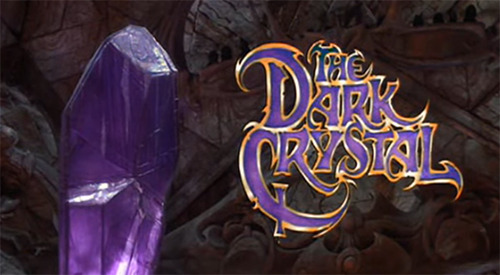
Can’t beat that opening theme.
Day 22: Your opinion on the sequel comics [Power/Beneath the Dark Crystal]
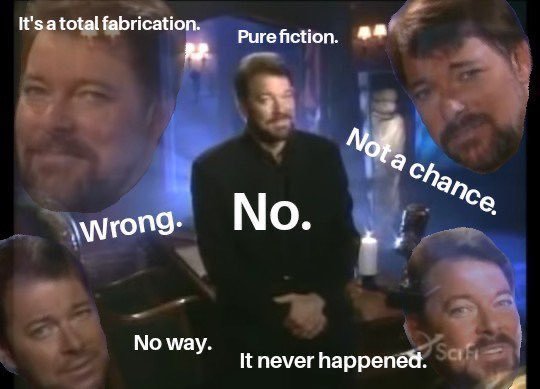
They have cool concepts and ideas, but they’re not written well. Power is just the movie if it was put into a blender and shredded and ignoring a large portion of established lore for the sake of plot. And Beneath is just a generic fantasy story with the Dark Crystal logo slapped on it.
Day 23: Which character from the YA novels/comics do you wish we would see more of?
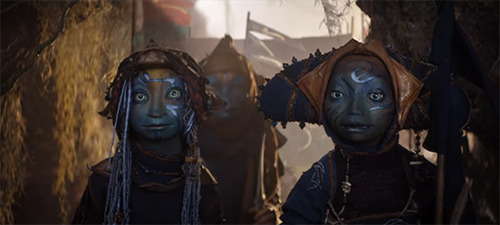
There are plenty of characters that are a given to appear in the series at some point (skekSa, skekLi, urSan, etc). And of course I want to see them, but I really hope Periss shows up (and his brother too). He is one of my favorite characters from the book series and we could use some more Dousan rep!
Day 24: Your opinion on the Age of Resistance comic?
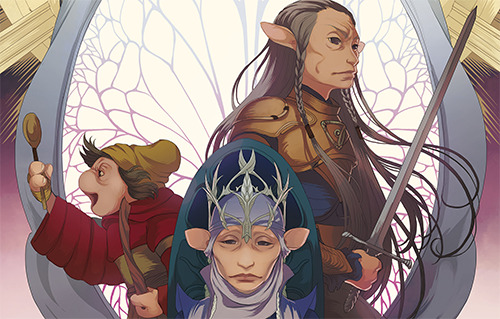
I have yet to read the comics. I’m waiting on them to be part of a collection so I don’t have to buy all of the volumes at once (I prefer owning physical copies). I’ve heard good things about them, especially the story with Hup and the current Mayrin arc. I’m excited to get my hands on them.
Day 25: The best moment/scene in the series?
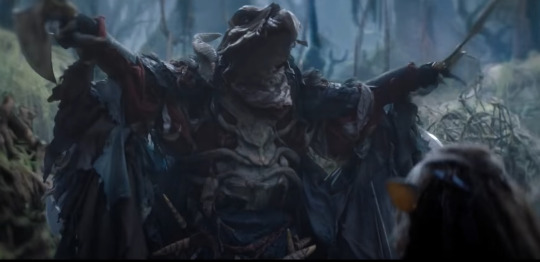
There are a lot of great moments, but Rian and Ordon’s fight with skekMal is still my favorite in the entire series. The "Speak For the Dead” scene is a close second.
Day 26: The death of a character that hurt you the most?
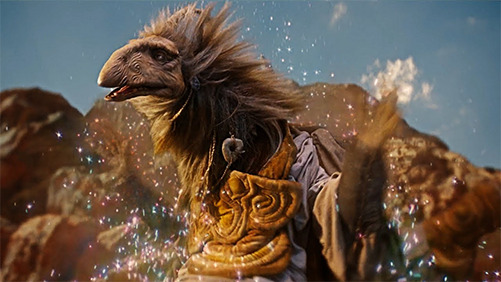
He did not deserve this. Fuck you, skekMal.
Day 27: Your favorite episode from the series?
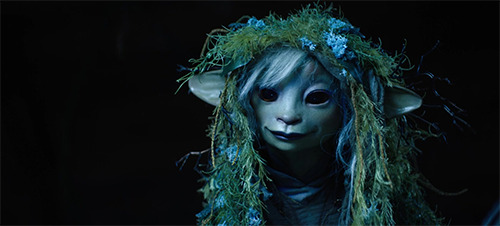
It’s got to be 4. Not just because a number of my favorite characters debut in this episode, but it’s an important one for the plot. Stakes are being raised, we’re seeing set ups to major story elements and character arcs, and events that impact the rest of the series. It also has a handful of my favorite character moments and interactions.
Day 28: Your favorite non-skeksis and non-gelfling character? Why?
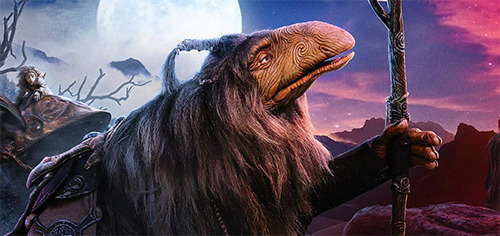
I’ve come to realize the reasons why I love urVa are the same as why I love skekMal (incredibly appropriate I might say). There’s enough information about him that we get a good understanding on who he is as a character, but still mysterious enough that there’s interest in wanting to know more. Much like his skeksis, he’s unique from the other mystics and thus giving him unique experiences that are fun to speculate. However, the YA novels are responsible for my current fondness of him.
Day 29: Do you like the urru and skeksis apart or like them as urSkeks together?
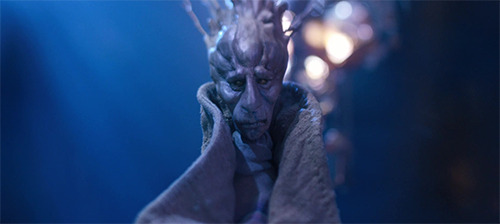
A main theme of the Dark Crystal is unity and balance. The main conflict of the franchise are the skeksis, the broken fragments of their urskek self who, according to the writers, “...[have] a dire need for the qualities they lack”. Their only salvation is to become urskeks again and unfortunately many of the pairs never achieve this. They’re basically a giant allegory for the self and self-love. While we don’t really know what they were like when they were an urskek (aside from SilSol perhaps), we can get some understanding when we look at their pairs and see what traits they share. Speculation is also fun! So as much as I love the skeksis and mystics as individuals, I prefer them to be whole again.
Day 30: What are your wishes for a possible season 2?
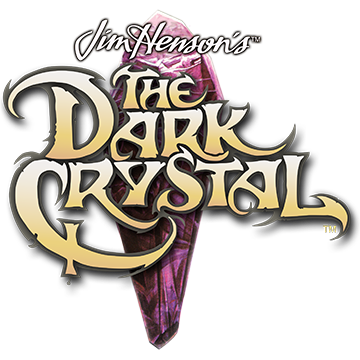
A whole bunch of things. I want to see them explore more about the mystics and their lifestyle, having Raunip play a big part in the plot, seeing more of skekSa’s fall from grace from her perspective, the beginning of the Garthim Wars, and more.
17 notes
·
View notes
Note
Your ranking of RWBY seasons?
Coming at this having binged 1-6 in a few months (and I pretty much never binge) last summer:
7. Volume 1

Oof. As I’ve said before, I started watching this because I was interested in the DC tie-in comic, and this fell exactly within the realm of ‘fun enough to distract me on the treadmill, but not good enough that I felt the need to watch it properly on my laptop when not on the treadmill’. Some of the building blocks are there from day one - the music slaps, the fight choreography is top-notch, the characters are generally likable enough, and the aesthetic is in place - but it feels like light, airy empty calories, and Jaune is genuinely insufferable before his arc begins in earnest (and even occasionally after for awhile there!). And then it sort of...stops, more than properly ends, was my experience of it? With the big character development being “the rich asshole racist girl has tacitly agreed to be less racist”? It’s...I understood from what I’d heard going in that its rougher edges were sanded off over time, but I was in retrospect investing a ridiculous amount of trust in it at the time. I’d probably like it a lot more now knowing where it’s all going, but even so.
6. Volume 2

Apparently it’s considered a Hot Take to think the first two seasons were the rough patch the show had to get through rather than the gold standard it never again reached. Which I kind of get given that’s where original series creator Monty Oum was involved before his tragic passing, but also I don’t get even a little bit and I just have to throw up my hands and admit there’s no accounting for taste. While this carries over most issues from the first - and also painfully hinges the conclusion of one of its biggest subplots on a guy-in-a-dress gag, even if feels less cruelly intended than it probably *could* have in 2014 and is paired with a dope dance number - it does feel more fleshed-out and cohesive, with the beginnings of serious character development for most of the major players, and also it’s the one where a corgi is fastballed at robots.
5. Volume 5

This is sort of difficult, because the culmination to this leg of Yang’s arc is about as good as the series has ever gotten, and that makes up a LOT of this season, nevermind the catharsis of the band getting back together bit-by-bit. But also this is where the Faunus allegory climaxes in a respectability politics message that plays incredibly rough, especially now (doesn’t help that it was as I was catching up that Jonathan Hickman’s “what if fuck respectability politics actually” X-Men relaunch was coming in like a nuclear piledriver), and *also* makes up a lot of the season. The rest of the cast’s the decider, and while there are several really good moments, it is also literally them waiting around for a season for the bad guys to show up, and then when they do it’s less the titanic showdown between the two opposing camps you’ve been waiting for so much as “we need Cinder to run into Jaune to move his arc forward, and to deal with Raven for the sake of the plot and her stuff with Yang, so I guess the other bad guys have to be there too until we can shuffle them offstage”. It’s all still very solidly executed, there’s more good than bad, but it’s definitely the most uneven of the series.
4. Volume 3

Ah, the tournament arc, except that’s not really what it ends up at all. For all the trappings, and all that it does move everybody forward, this volume is really Pyrrha’s story with the rest dipping in and out. It *has* to be, because her death has to bear the weight of being the emotional and symbolic foundation that the entire rest of the series will stand on, and god if they don’t put over her shattered heroes’ journey to the point that by the end I went “dammit, in 3 hours this took me from my treadmill distraction to the piece of media I’m currently most engaged with emotionally”. She’s the season in a nutshell: the big threat came about 2 or 3 seasons earlier than they would have been ready for it, and they don’t manage to come through and save the day anyway, and now everyone has to live with the consequences. An incredible achievement coming from this crew on the heels of a real-life loss that easily and justly could have brought the show grinding to a halt as it instead fully grew into its potential. Also I feel like this season has the best ratio of absolutely banger fights in the franchise.
3. Volume 7

I strongly considered putting this at #2, and while I didn’t quite get there, I’d still say without hesitation that this is the most cleverly structured and thoughtfully put-together season of the show. As Volume 3 was Pyrrha’s story, this is Penny’s (with major beats for Ren/Nora/Weiss on top, and if not character development significant character definition for the rest), as the robot girl learns the value of humanity in parallel to the tin man rationalizing an unthinkable monstrosity to himself. A volume about how no, it’s never going to go back to being like Volumes 1-3 again, the characters have been through too much and this is a different show now. One that in this instance forces the leads to apply their hard-earned moral lessons in a relatively realistic context: basically, shōnen will to win and stand by those who need you vs. the seemingly pragmatic lure of military realpolitik that threatens to slide all the way into fascism at essentially any moment depending on where the top guys’ head is at. While it’s not as emotionally intense as some other seasons (which is sort of necessary, as there’s an illusion of ‘everything’s gonna work out okay now!’ that needs to be built up before it can be shattered), I’m really, really enthused about the direction for the series going forward this seems to set up.
2. Volume 6

The worst I can say here is that it’s segmented severely in a way that none of the other seasons are, but each of those segments is AAA+, so I can’t really complain too much. Everyone but everyone’s put through the wringer with this one while coming out the other end stronger, the superstructure of the plot is finally fully revealed, it flips genres on a dime from RPG quest to fantasy epic to supernatural horror to weighty domestic dramatics to a climactic samurai showdown to fucking Pacific Rim, and it has the single best fight in the series. Unless you’re one of the weird “Adam was shortchanged!” folks I know are out there, I can’t imagine not loving this one.
1. Volume 4

Okay if volumes 1-2 being considered the best are “there’s no accounting for taste”, knowing that 4 is apparently one of the more consistently derided is utterly beyond my ability to summon up a rationale for. If everything beforehand was functionally an extended prologue, this is where the story starts, where every single character grows beyond an archetype and a sympathetic background into the struggles and strengths that will define them for the rest of the show. This is where you get where Weiss is coming from and trying to move past, this is where Blake articulates her pain, this is where Yang is understood as the brawler who’s about to be faced with nothing but problems she can’t just punch past, where Jaune’s efforts at holding himself up as a macho hero stop being cringe comedy and become the disastrous means of coping that’ll define him for several seasons, where Ren and Nora become fully-formed, engrossing figures instead of gag machines, and where Ruby becomes who can hold it all together. It accomplishes more in defining these people and why we should care about them than any other season has come close to matching, and handily takes the win as far as I’m concerned.
17 notes
·
View notes
Text
This is a Public Service Announcement
Gather round children. I think this is a good time to remind everyone the difference between encoding and decoding meaning in text
Now, I'm not going to talk about the actual theory behind this bc no one cares prob, but heres the TL;DR:
The interpretation of a text doesn't have to line up with the creator's intentions. In reality, it usually doesn't.
Let's break it down:
Creating texts (text = books, TV shows, movies, comics, paintings, etc) involves a process called ENCODING. The creator, whoever they are, has some meaning in mind when they make the text - it's supposed to be funny, it's supposed to be heartwarming, it's supposed the be an allegory for the Vietnam War, whatever.
So when the text is shown to the public, some theme or meaning - however insignificant it may be - has been Encoded into it. It may be the literal story you're telling, but it can be more subtle. Its for the creator to decide how they want to do it.
Important: there is no such thing as a text with no Encoded meaning. It's like ppl who say something "isn't political" - everything is political bc everything involves interactions between co-existing indv balancing cooperation with their self-interests, which is what politics really boils down to (feel free to disagree with my definition as loudly as you'd like in my inbox - my point stands)
Now there's a completely separate process taking place with the audience who interacts with this text called DECODING. This is when your viewers/readers/listeners/audience interacts with the creator's text and makes meaning of it.
If the creator is successful, the audience will Decode the text and understand their intented meaning - "crime doesn't pay" or "sharing is good for everyone" or whatever. Good storytelling, therefore, comes from the successful communication of the creator's intended meaning.
Now here's the rub: authorial intentions, at the end of the day, have NO bearing on what the audience decodes (i.e. interprets) the story to mean. Let me say it again: it doesn't matter AT ALL what the author meant to say, if that's not what the audience gets out of it.
In a lot of ways, I (a female white-person) think a lot of this tension is a white-person and/or male-person problem: it's hard to accept criticism for something you didn't mean to say. Like, you weren't trying to be racist - you just made a "historical" drama with no people of color in it. Your movie about gangs in LA isn't supposed to be offensive - there are just a lot of black and latino drug users in gangs. How is it fair to be criticized for saying something you weren't trying to say in the first place, right?
But here's the thing: when you decide to show your creative text to other ppl, you have invited those ppl to Decode your text. You've basically given up control of the texts meaning - all you can do is hope you did a good job Encoding your message so that ppl understand it.
It's like when you accidentally say something that upsets someone: you're supposed to apologize, even if you never intended to upset them. Why? Bc we recognize the fact that what we mean to say and what ppl hear isn't always going to line up. Sometimes it's bc you didn't know some term was racist, but other times (if you're like me) you've said something careless like (after watching a child actor play outside before a show) "I admire your commitment to looking the part, but you probably don't need the smell sweaty too: the audience can't tell, but your castmates can". Was that an incredibly rude thing to say to that child actor and his mother? Yes. Yes it was. Did someone have to point that out to me a few minutes later? Also yes. Bc while my boss knew I wasn't trying to be an asshole, I had been an asshole. So I needed to apologize (and I did)
It all comes down to two things:
1) If you want to tell ppl exactly what you mean, write an essay (or a long Tumblr post)
2) If you don't want ppl to interpret your work, just don't make it public for fucks sake.
This has been a lengthy PSA
#discourse#i invite everyone to fight me about the inherent politics of everything#esp Anna#bc if she disagrees than i might be wrong#im frequently wrong actually#but not about this#psa
5 notes
·
View notes
Text
It has layers: An analysis of Shrek's commentary on race, femininity and the power of white beauty
(I know I said I wouldn’t submit this essay. And look, you don’t need to read it. But it’s a serious essay and something I am very passionate about. I hope you’re not mad. It’s just important to me.)
Subversions of classic fairy tales are commonplace staples in the world of fiction. Whether that includes grimdark retellings, parody or adult-oriented interpretations of the morals, twisting these well-known and classic stories for a piece of fiction is an easy way to deliver a subversive experience because the visual framework and shorthand are already present in the audience’s lexicon.
These fairy tale parodies/retellings typically take a story oriented toward young girls, and either for the sake of comedy or in efforts to capitalize on an older male audience, inject levels of violence (ex: Revolting Rhymes by Ronald Dahl, Fables comics) or sexual themes and interpretations - often sexualizing female characters in the original stories (ex: Red Hot Riding Hood cartoon May 8, 1943) into the fairy tales.
Shrek is a very obvious subversion of fairy tale stories, honing in specifically on the tropes of the Walt Disney versions of classic fairytale stories for its parodic forumla; but rather than rooting the subversion in inducing a raunchier/more violent take on these stories, the subversion is actually one rooted in a feminist rejection of Western beauty standards and a commentary on race in America.
Fiona and White Beauty
Fiona is a character who is presented to the audience with all of the necessary visual and storytelling cues necessary for us to inform our interpretation of her as a typical beautiful princess: she is a thin, traditionally beautiful damsel in distress.
This interpretation comes with it our built-in ideas of what a beautiful princess should be (dainty, kind, loving, etc.) but it is subverted with the duality of Fiona’s visual form, and the visible efforts we see Fiona take to fit into our preconceived ideas of fairy tale princesshood.
During the day, Fiona has a more socially-acceptable form (smaller-framed, white) and she takes efforts to wear an air of demurity and exaggerated femininity, as is expected of her by the society she lives in. She hides interests and skills not typically valued in women of her environment (kung fu, etc.), feigns helplessness and formality for her savior, and she demands the outcome that she was raised to believe she should want — a fairy tale ending with a prince — and code-switches into princesshood to get that.
But during the night, Fiona transforms into an ogre - and while the face-value interpretation of this as visual shorthand for not having the features deemed beautiful by Western beauty standards (i.e.: thinness, whiteness, femininity, etc.) is definitely present, it would be remiss of the viewer to not observe the parallels the ogre experience echoes of the experience of people of color in America.
Our peek into Shrek’s day-to-day life at the beginning of the film strengthens the metaphor - Shrek is, at his core, a man who is assumed violent by the public at large due to his physical appearance, with these assumptions impacting his treatment by nearly every character in the world he resides in. These assumptions and the microaggressions he faces inform his decision to live in seclusion in an under-funded area of the woods with little-to-no attention from those in power, where he is assumed dangerous and mocked or dismissed by the majority community — an experience that many men of color would say are echoed in their own day-to-day lives.
Shrek is also coded as undesirable because of his ogreness, and the in-story-public and audience is encouraged to find the idea of him finding love with a white human princess to be a ridiculous notion.
Similarly, Fiona’s nightly transformation into an ogre comes with its own list of assumptions on behalf of the audience — that it makes her less desirable and less likely to find love.
So, paired with what we know about Shrek’s ogreness and the way it impacts his experience, Fiona’s transformation into an ogre isn’t just an aesthetic message for the viewer - it can be interpreted as a racially-coded one.
Sometimes the beholder is just too damn white: Beauty and the moral of Shrek
It often happens that fairy tales and other stories oriented to younger children or younger girls cannot decide if beauty is important or not.
We have the Ugly Duckling, where the namesake protagonist goes its entire life feeling ugly and like it doesn’t belong until it turns out the duck was hot all along and just had not yet hit puberty. We also have stories like Beauty and the Beast where aesthetic beauty that complies with Western standards of beauty is simultaneously supposed to be treated as unimportant to Belle (in lieu of the Beast’s other traits) and treated as a reward for the Beast, for once he finds love. In both of these stories, characters the audience is supposed to sympathize with end up acquiring the beauty they seek.
Shrek is a film that does not give beauty out as a reward. In the movie, Fiona stays an ogress. It is treated as a plot twist, and in first viewings, the audience might wonder what still needs to be done for her to get the ending she wants. But then something happens: Even while the public at large mocks Fiona, and treats her as ugly, Shrek says she is beautiful anyways.
And while Shrek’s idealization of Fiona as a beautiful person does not match the masses’ interpretation of her appearance as ugly, the film does not frame it as incorrect. Instead, the film frames the masses as wrong.
A socially-acceptable standard of beauty is rejected by the film’s core message, rather than the prize for the female protagonist.
Fiona is beautiful.
Not because she is eventually going to turn back into a thin, white princess.
Not because she has a heart of gold, and that’s more important than beauty.
She is beautiful because she simply is.
Fiona is big, and she is different, and damn it, she is green. But she is beautiful, and the movie Shrek says that if the public can’t see that, fuck the public.
The interpretation of Fiona’s ogreness as allegory for being a person of color strengthens this message. Ogreness is beautiful, just as black is beautiful, and brown is beautiful, and fat is beautiful.
We are encouraged as a society to reject these features, and Shrek encourages us to reject that rejection.
Conclusion
While many subversions of fairy tales find themselves taking a classic story aimed toward young girls and parodizing it for the sake of an older audience, Shrek delivers a comedic and subversive experience while still maintaining feminist themes and a surprisingly nuanced take on the way those different than the governing group can find themselves ostracized and assumed to be dangerous.
Shrek is not a story for edgy teenage boys.
Shrek is a story for anyone who has felt like they could not find acceptance because of who they are.
Shrek is a story for the All Stars.
I have to say I hadn’t thought of this idea before. The stereotypes and treatment of ogres in the film definitely parallel people of color within life and alternatively people that differ from what is seen as the norm in varying degrees. Seeing the connection now it’s hard not to see ogres as a metaphor for people of color. I’m not sure what that means entirely for Fiona as her transformation into an ogre could be at least a couple different things from what I first thought. It could be symbolic of people with mixed features, people of color that use certain beauty methods to replicate the standard white beauty, or something entirely different.
I hadn’t really considered to examine the movie before, mostly because of its effect on my daily life, but this is interesting.
Also, I am not mad whatsoever. Even if I have seen more of Shrek than one human should, it doesn’t make it or the ideas that can be taken from or about it less important and valuable. Additionally, I can tell you care about it and that in of itself gives it more value.
9 notes
·
View notes
Note
Serious non-troll: What if you like the cop-outs and the scrambled bullshit plots and the nonsense towers of half-constructed ideas? I agree that for example Nomura is a goddamn crazy person but I find his convulsions fascinating and want to see more of them.
i mean, you’re entirely within your rights to do that. it’s just frustrating that there’s visibly no effort put into any of it, and he’s just writing for the sake of what makes the trailer look good, and that’s been 100% to the detriment of the story ever since he’s started doing it
i’m not even inherently opposed to ridiculous convoluted bullshit. i’m one of those pretentious fuckheads that unironically likes End of Evangelion and thinks it made perfect sense, obviously, duh, with all its absolute nonsense of adam and lilith and rei being a god-analogue from absorbing both the white and black seeds and allowing shinji to dictate the ultimate outcome of third impact in the culmination of a couple of really fucking long and extremely obtuse character arcs. i mean, hell, i’m 38 chapters into a fic that is running off nothing but weird high-concept ideas of how reality and parallel universes work and abstract metaphor andsleep deprivation. in any other circumstances, i’m fine with convoluted batshit nonsense.
i think the best way to explain the heart of the issue is to look at what happened to the matrix trilogy. or actually wait this is tumblr, everyone’s in high school and would’ve been foetuses or something when Revolutions came out. homestuck, then. we’ll look at homestuck.
okay so homestuck. remember when that was as big as it was? initially, the big stumbling block was the slow pace of act 1 where john just kind of fucks around throwing glass at clown dolls for a while and if you weren’t into that kind of humour that was where the comic immediately lost you, but what ultimately got the ball rolling was [S] WV: Ascend. the general metric back then was if you weren’t hooked by that one, you wouldn’t like homestuck at all, and for many people that was the point of no return. the reason WV: Ascend was as big of a deal as it was is that we’ve been seeing a bunch of disconnected nonsense happening all over the place, and this is the first time we see our first major time loop actually closed, with the promise of a few more being set up. all that supposed joke nonsense we’d been watching the whole time? it actually mattered, surprise! from there, the narrative spends a lot of time introducing a lot of new concepts – we have captchaloguing and paradox slime, and time travel, and doomed timelines, and exiles and future versions of planets from a parallel universe the metanarrative being perpetuated by the author being diagetic and fuck knows what other things i’m forgetting about. and then, to throw you for a loop twelve whole other characters show up on top of that. so then the narrative needs to spend time establishing who these people are and what their relevance to the story is – which it does, by having them be active participants in the first arc as things go on. this ultimately culminates in [S] Cascade, where we see all these different concepts eventually tie into one another because they were deliberately set up to, and it’s at that point that you figure, well shit we’ve hit a point where all the time travel stuff has finally come to a head. and with it, you’d expect it to also bring all the character stuff to a head too, but instead hussie has an entire extra act to go so we can’t have that resolve yet.
so in the meantime, here are 20-ish whole other characters doing some other things. but we don’t have time to establish what’s effectively the silmarillion by now, so we have to speed past it, meaning we aren’t given a chance to care about these new people. but we can’t have a chance to care about them either, because we still have to tie all this into 5 whole previous acts that are meant to feed into this. at this point, homestuck is visibly collapsing under its own weight. character arcs are forced to fart around in circles because the status quo can’t change because we still need to make it to endgame with these character dynamics more or less intact. but that’s boring to read so we’ll do this entire “what if” thing and then retcon it all out of existence, and then have the fact that you can retcon things suddenly become vital to the resolution of the coming in place of anything we’ve already established previously – not the time travel, not the parallel universe with the trolls, not even the whole thing with the Scratch leading to the alpha kids being here in the first place – when the mechanic was only introduced in the first place to sloppily patch a story together that had long since devolved into infodumps that served to paint hussie further and further into a corner as he was forced to define his lore to get the plot to keep moving forward despite the fact that the narrative wasn’t focusing properly on the people that could make that happen anymore because the story had since switched focus from those people almost entirely.
and in the meantime the damn thing got eaten up by filler, and suddenly characters from that filler are showing up like they were totally relevant to the main story the whole time even though literally nothing they did in their own subplot had any direct bearing on the story at large, unlike the initial 12 trolls. why yes, Alternate Universe Calliope was a completely necessary addition to the story! didn’t you see our important sidestory thing where they do Stuff, and then her showing up in the climax to resolve some other things that are sorta disconnected from the main plot anyway?
not to mention the shipping. nothing ruins a story faster than throwing in a love triangle or eight, and then immediately invalidating all the character growth that happened on top of that anyway by having it literally never happen. not that it would’ve mattered anyway, because remember, we never actually got to have any of this really developed to begin with.
by the time we hit end of act 6, there’s been so many new concepts haphazardly stapled onto the story and so many threads brought up and discarded entirely when we already established back with [S] Cascade that the story works best when they actually do this and it is doable, that it stops being merely complicated and off the wall, and starts being spread too thin, incomprehensible, and ultimately no longer part of a whole narrative deliberately comprised of interlocking storylines. shit’s just kinda happening at you, and rather than getting to see parts of a text interacting as a result of them coming from somewhere for the express purpose of then going to somewhere, you’re just being asked to accept that, yup, that’s a thing that’s going on right now. neato. sure is some stuff happening and whatnot. and in the end, for all that posturing, it didn’t even do anything. in pre-cascade homestuck that wouldn’t have even been a full flash. a bunch of nonsense happens, and then They Fightan Good, and then it’s over and there’s not a single time paradox or meta-interaction to be found. none of the stuff they built up to over all these years mattered, and neither did any of the stuff they just threw in, either.
i’m sure you see what i’m getting at with this.
(also he treats the women in his stories like shit and quite frankly i’m sick of it and even more sick that people keep giving him a pass for it because it’s practically reached parody levels at this point , so there’s that)
i have no problem with convoluted twisty bullshit in and of itself. but it has to accomplish something aside from just existing, and nomura doesn’t do that. by his own admission, kingdom hearts wasn’t planned, and it shows really badly. characters and entire story mechanics and plot lines are introduced solely for the sake of introducing them. they don’t go anywhere or build to anything, because they can’t, because fuck we have to stall for kh3 shhhh just keep adding more soras and hopefully no one will notice. i think the last time any of this actually mattered was kh2, and even that had a lot of the issues i’ve mentioned here. as a result of all of this, the character arcs suffer a lot, and you’re left with nothing but a big ball of plot twists that goes nowhere, and a bunch of characters that only somewhat have anything to do with any of it.
i don’t feel like it’s overly nitpicky to find this kinda gross and seriously insulting of the audience’s intelligence. it’s just lazy time-stalling. i get that people sometimes really don’t care about stuff like narrative and character development and are just here to see riku punching mike wazowski in the teeth or whatever, but i think it’s disingenuous to pretend that these aren’t nonetheless important parts of a game’s construction – especially a studio that used to openly pride itself on selling games with a focus on story.
and the genuinely frustrating part is, no one cares. people are gushing all over everything square puts out because it’s square, so they know they don’t have to put effort into their stories. i’m well aware i’m in the minority for saying that these games are bad. but i also thought we were done with treating, “it’s just a video game, bro! why do you care so much about the story having quality as a narrative? this isn’t an english class!” as a valid rebuttal.
maybe i should’ve used the matrix trilogy instead. most people hate movies 2 and 3 for the weird “YOU’VE ALREADY MADE THE CHOICE/EVERYTHING THAT HAS A BEGINNING HAS AN END NEO” shit and the bonkers christ-allegory ending. i hate it because neo is about as interesting as the rock that cracked goofy’s skull open.
#asks#kangdan horfs#do i put this in the discourse tag even though its's not vii?#squid alienates kh fans#that's a tag now#hamsteak#Anonymous
4 notes
·
View notes
Text
The Book Ramblings of January 2019
In place of book reviews, I will be writing these ‘book ramblings’. A lot of the texts I’ve been reading (or plan to read) in recent times are well-known classics, meaning I can’t really write book reviews as I’m used to. I’m reading books that either have already been read by everyone else (and so any attempt to give novel or insightful criticisms would be a tad pointless), or are so convoluted and odd that they defy being analysed as I would do a simpler text. These ramblings are pretty unorganised and hardly anything revolutionary, but I felt the need to write something review-related this year. I’ll upload a rambling compiling all my read books on a monthly basis.
Wise Blood - Flannery O’Connor I haven’t read much American literature, but far be it from me to state that the sole reason for this is my position as a staunch Englishman. In truth, I genuinely just don’t have much of an interest for the great American texts; the enforced reading of such literature during GCSEs and A-Level taught me that even the American texts with the best prose were not on the most interesting of subject matters, concerned with social progress or supposedly deserving of merit because of relevant historical context, as opposed to actually just being, well, enjoyable. Yes, I am obviously over-simplifying to a ludicrous extent, but these were the thoughts that I had way back in the halcyon days of school, and subsequently these are the thoughts that I’ve carried with me since, simply because I haven’t been arsed to actively try to challenge them. However, my infatuation with the grotesque was bound to bring me to the realms of American literature at some point, and so asking my American friend to procure me a copy of this book with a decent cover, I started on this Southern Gothic classic. I love the idea of transposing the gothic genre to a setting different than one would conjure up from the word ‘gothic’, and the fictional deep South town of Taulkinham does a bloody good job at capturing what I want; there’s madness and isolation and a sense of oddity in the air, and the town is populated by a gallery of fantastic and memorable grotesques. The fantastic and evocative prose, almost comical at points, belies how fucking odd the story’s events are, and breathes life into this setting in a similar way to Hammett’s Red Harvest; this is perhaps one of my favourite techniques in literature, simply because I’ve never thought of envisioning America in this fantastical way. The story is rather fragmented, with many of its major scenes basically being some of O’Connor’s short stories stitched together (and the Frankensteined nature of the story does result in a few chapters having noticeably different writing styles to the rest, or some characters’ decisions that would develop into these slotted-in short stories seeming odd and poorly explained). With this awareness, I remain unconvinced with critics’ dogmatic statements along the lines of ‘O’Connor evokes an individual voice/style, unburdened by the rules or conventions of story writing’; if she had that in mind, as a deliberate means of creating a fragmentary narrative in the name of the genre or in reflection of the characters or what have you, she came up with that shit after she started writing. It is a view that I could subscribe to, on account of the fact that this is not a stereotypical narrative. Characters don’t do much or evolve much, with the decisions made by the characters seemingly motivated more by manic episodes than actual rational thought; Hazel, for instance, is depicted as basically coming up with the teachings and philosophies of his Church without Christ as he goes along, repeating his new discoveries to himself and to anyone who will listen as soon as he formulates them, and it is this improvisational drifting (motivated by his own warped thinking) that defines his story’s progression. What separates gothic stories set in recognisably recent times to gothic stories set in the distant histories of castles and deep dark woods, is the changed understanding of madness, and I’ve talked about this a lot in my rambles on Le Fanu but I’ll delve into this book’s treatment of it. In the words of Bakhtin, ‘in Romantic grotesque, … madness acquires a somber, tragic aspect of individual isolation’, but before the advancement of scientific knowledge as to what actually constituted ‘madness’, it often took the form of histrionics and melodrama. This is all fine and dandy when you’re writing a story about tormented murderers hearing hearts beating under the floorboards, or masked men with skeletal faces scuttling around opera houses, but when you’ve got to transpose this madness to a recent-ish society, with said madness being expressed or brought out via recognisable themes such as religion, you’ve got to tone it down a bit. As such, Hazel and Enoch are manic, not mad, and this is excellently conveyed through their individual speech styles and the ways that other characters interact or interpret the two; my favourite example of this is Enoch running down his day’s activities to himself as a strict and sacrosanct ritual of undeniable importance, swiftly followed by the reveal of the actions’ trivial nature (and his co-workers negative opinions of him as a result). WOULD I RECOMMEND?: HELL YES
The Crock of Gold - James Stephens Trying to ascertain the seriousness of this text boggles my brain. Let it first be said that I rather like this book, despite the shoddy John Murray publication that I have it in; I was prompted to purchase it on account of its place in the great ‘Irish comic tradition’, basically expecting something along the lines of The Unfortunate Fursey, but I instead was greeted with a much more thoughtful and interesting read that I advise everyone to pick up at some point, with the caveat that you have to be in a very specific mindset to read it. It’s a funny story, but it is quietly funny; the humour comes from little quirks in the writing, in the speech and actions of its characters, in the ultimate charm of the story. The dialogue is deliberately circumlocutive and often rather meaningless, pondering incessantly on philosophical matters big and small, and ofttimes the narrative itself reflects these rambling trains of thought, most notably a long aimless pilgrimage wherein the Philosopher stumbles across snippets of other peoples’ lives, experiencing quibbles and learning folk wisdom and ruminating on the head and heart. The book’s world is charming, all made up of storybook character archetypes and Irish folklore (described matter-of-factly and easily accepted as truth); ofttimes, the information that we are given is ultimately unimportant and has no bearing on the overall story, and this is a statement that can, truthfully, be applied to much of the text, but it is all the same delicately written and rather pleasant. The book does perhaps toe the line on this point with its rambling philosophical paragraphs from the Gods, with its grand allegories and metaphysical nonsense getting a tad wanky and mind-numbing, but it’s not the most egregious thing in the world. In any case, the philosophising of the Philosopher is entertaining enough to make up for the rather more dense philosophising of the Gods, being much more like the aforementioned circumlocution, going off on unrelating tangents and eventually bringing the rambling back around to the initial point that catalysed said rambling. I bring this up not only as a point of comparison, but because it ties in nicely with the commonly-utilised storytelling method of basically going off on a tangent, following one person off on their quest before jumping back to where the narrative left off to see how things are doing then. This can perhaps be attributed to this book’s lack of urgency or real danger, and thus lack of a need for hastiness and rapid jumping from one person’s story to another. This extends even to the final resolution of the humans’ storyline, which basically amounts to one sentence saying that what they set out to do was done and dusted; there isn’t even a scene to show everyone happy again, because it is simply implied that things will go back to the jolly equilibrium. Hell, when the book incorporates wistful or thoughtful or even flat-out sad tales, no resolution is offered for them. The story just goes on, and we are presumably meant to just assume that all will end up alright in the end, or at the very least, all will just end, and then it’s not worth worrying about any more. Reading what I thought would just be another fucking The Unfortunate Fursey type of fantasy book has really evoked some unexpected feelings in me. So that’s nice. WOULD I RECOMMEND?: YES, IF YOU’RE IN THE RIGHT MOOD
Gulliver’s Travels - Jonathan Swift I’ll level, I went into this book expecting a low-brow adventure story about little dudes and fucking massive units. It is, in fact, a tad more complex than this. This book is a lot of things; it can be read as a storybook adventure novel, but it is also a satirical piece, both of Swift’s society in general and of the travel writings form, and it is this satire that I am not too fond of. But we’ll get to that. The main technique utilised in this novel (yeah I’m just going to call it a novel for simplicity's sake) is optical conceit, and the idea of viewing familiar things from different perspectives or in different ways, presenting them in a new light as ridiculous or laughable and perhaps to make us reevaluate the workings of society so farcically presented. This technique is noticeable mainly in the first and second travels, coincidentally the two travels that are most widely known, and this optical conceit is a concept that I like a lot more in theory than in practise. The first travel takes us to Lilliput, the island of the small blokes, and here the small size of the people links in with their small-mindedness and melodramatic quibbling over minor matters, but in the second travel to Brobdingnag, land of the big dudes, the size of the folk is seemingly unrelated from the satire. With the possible exception of the pompous Prince, none of the natives have any sort of comical largesse or egotism that might have related to the satire. And then when I had this in my mind, I began scrabbling around to try and find some other snippets of how the native people tie in with the satire, to little to no avail. The Lilliputians put great faith in long and formal written legislations and diatribes (related in full in Gulliver’s account), suggestive of shrewd ink-nosed clerks hiding behind their papers, and much of the Brobdingnagian report is one long rambling philosophical back-and-forth between Gulliver and the Prince, suggesting these large people have large mouths and loud opinions, but the satire, in my opinion, is a) tenuous and b) not what I’d consider engaging reading. And that’s not even considering the specific basis of the satire: contemporary politics! This book is striking an interesting balance between being entertaining in its own right, and ostensibly being entertaining because of its significance as satire, that every character or event in the story is comically reflecting some real-life event in English politics. To this, I have to compare it to Calvino’s story Invisible Cities, and it’s varying depictions of Venice through different disguises; it doesn’t matter how you tart up your source material, or how colourful your new layer of paint is, because if I’m not interested in the original source material then I probably won’t give too much of a toss about how it is newly presented. And contemporary English politics really could not appeal to me less, even if Swift does dress them up as Lilliputian acrobatic displays or thinly veiled warring kingdom allegories. That’s not to say that there is nothing funny to be found in this text; the details in the stories that are not intended to serve any satirical purpose, and instead merely to emphasise the differences between worlds, are always great fun. My favourites are the Lilliputian’s alien descriptions of the gigantic contents of Gulliver’s pockets, and two great instances of humungous monstrosities in Brobdingnag, namely the huge lice on the giant beggars and the scene of a Brobdingnagian mother breastfeeding; the sheer revulsion that Gulliver has to this spectacle is fucking hysterical. The travel to Laputa has got a good grasp on linking the fun content with the satirical aspect (not only is the flying island a great pisstake of science-minded learned folk, but is also like something out of a fucking Lem story), but the overall story is generally rather boring and without much in the way of obstacle or threat. The Land of the Houyhnhnms doesn’t really have the optical conceit, being more of an abstract switcharoo of horses and people, with not much relationship between the two races and a lot of obvious satire about man’s bestial nature. There are occasions of overt physical comedy, again tied in with these changes in size; Gulliver is in one story dousing great fires with his almighty piss stream, and in another being dressed up like a doll or dunked in a bowl of cream by a mendacious dwarf (or rather, a dwarf by Brobdingnagian standards). I am fully in accord with the former sort of comedy, not only because such imagery of dousing fires with a slash puts me in mind of Gargantua and Pantagruel, but because it reflects this book’s fun indulgence in crude toilet humour. Crude toilet humour is fun to begin with, but Swift uses scatalogical humour to demean the noble form of travel writings, taking a moment from seriously discussing the learned folk and their cultures and customs to describe his shitting habits. The latter sort of comedy, however, that serves to emasculate Gulliver by having him toyed with by giant folk or entrapped by tiny folk, only highlights to me the lack of character that Gulliver has, beyond being our narrator. I’m sure that critics will argue for his supposed egotism or pomposity or whatnot, but such details in the text are thin on the ground, and if Gulliver is not characterised as being a dick, why should the reader find it entertaining or cathartic when he gets his shit handed to him? These problems perhaps originate with Swift’s worries of the character of Gulliver being a reflection of himself; he is willing to put the character through light slapstick shenanigans, but he hasn’t got the balls to go too far lest it tarnish his own reputation. Apparently in one early publication of this text, Gulliver partakes in the custom of eating shit with the ape people, but oh no no, Swift couldn’t possibly have something that funny in the story in case anyone thought that he himself might truly be a coprophagous ninny! There is a strange bequeathment of snooty scholarly worth unto this book, considering that it does have talking horses and ape men who shit everywhere, as illustrated by the study done around this book (handily referenced in the editor’s annotations). Let me briefly give some examples. This book uses a lot of nonsense ‘little language’ for its place names and whatnot, and as you can tell by the fact that I’ve taken every opportunity to use the word ‘Brobdingnagian’ in this ramble, I’m rather fond of it all. However, amidst all the daft place names (all bizarre anagrams of existing places), the editor makes sure to highlight some as being ‘obvious, and therefore uncharacteristic’, as though there is a scholarly level of obfuscation or stupidity to adhere to in order to be respectable. This sense of superiority continues to the demeaning of one particularly transparent and obvious satirical paragraph, which is described as being ‘artistically weaker’ than the rest of the text; not that I’m defending the aforementioned insulted paragraph, because it isn’t that good, but the implication that the text deserves artistic merit because of the obfuscation of its satire rubs me up the wrong way a bit. WOULD I RECOMMEND?: PROBABLY NOT
The Nightwatches of Bonaventura - Bonaventura The new introduction to this text, written by the uppity translator Gerald Gillespie, is rather dogmatic in its excessive insistences of all of the things that this text is, or takes inspiration from. As much as I like to portray myself as a learned man and top-quality dude, I’m not so invested in contextualising this book’s composition that I’m willing to engross myself in Napoleonic war history or the works of Kant. What I am interested in, however, is the Romantic grotesque, for whilst Bakhtin’s infatuation with Rabelais’ grotesque completes eclipses any appreciation he might have of any writer who deviates from Rabelais, Bakhtin manages to spare a brief word of praise for this text amidst all the wanking over Rabelais, so I was intrigued enough to get myself a copy. This a book densely populated with great grotesque imagery and content, and as such it is a book that probably warrants re-reading with a certain subject in mind so as to allow for further unpacking, but within the framework of the grotesque, Bakhtin was right to say that this book basically epitomises the Romantic grotesque, because it’s all here in amazing detail. The story is a rambling introspective on dark topics, either prompted by the morbid and corrupt sights of the world around our narrator or plucked from the memories of our narrator’s own dark past. Said narrator, Kruezgang, brilliantly speaks on such subjects with amazing and colourful prose, with literary allusions and warped rumination galore. The other characters in the watches seem more like marionettes or shadow puppets, necessary to tell separate stories or fill a hole where there should be an aspect of Kruezgang’s past, but their purpose as such is fascinating enough and so excellently done that it doesn’t warrant criticism. The world is grim and grotesque, but depicted out as a joke via Kruezgang’s own view of it, described with poetical allegories and bitterly laughing at awful events by portraying them as black comedy farces. This book’s infatuation and idolisation of the mad and the strange and the grim is something fantastic, it really is. Now, having prefaced this ramble with such positivity, I can delve into a truth that looms over this text like a storm cloud; it is so incredibly fucking dense that I could not imagine rereading this book for any reason other than literary analysis. There is so much content, rich bloody content, in this book that it is easy to equate the feeling of numbness in one’s mind with an overload of such fantastic stuff, from the prose to the ideas to the fascinating storytelling, but this process of thought precludes the very important contributing factor to said mind-numbness, which is that the book seemingly just rambles about nothing at all! Am I to assume that such rich prose in the name of maddening circumlocutive (is that a word?) nothingness actually does have a purpose, and my mind just slides over it because it can’t comprehend the information, or perhaps just can’t contain so much information? Am I an uncomprehending fool for glossing over chunks of text, or am I just inadequately prepared to cram so much prose into my bonce at any one time? Such thoughts bounced around in my head as I was reading, and the only conclusion that I could come to was that I would be hard-pressed to recommend this book to anyone, for what if they encountered the same problems, and asked me to elucidate on such matters, when I have no answers to give them? Wouldn’t I look a fool then! But I digress. The introduction snootily says that to break down the narrative’s events chronologically would only ‘contravene the spirit… of the work’, which I believe insofar as a fragmented narrative obviously reflects the fragmented mind of the narrator (real in-depth analysis going on here), but that doesn’t mean that I won’t say that the narrative isn’t all over the shop, generally rather confusing, and interspersed with fragments of other stories of seeming tangential relation to Kruezgang’s storyline, all described with Bonaventura's same grandiose verbosity but often nowhere near as interesting as Kruezgang. Sure, I could have read into the exact (and no doubt important) purpose(s) of these segments, but a) just reading this book and revelling in its dark prose is an enriching enough experience without having to learn all the context clues that contributed to such nonsense being formulated, and b) most of the research writing about this book by Gillespie is just trying to figure out who Bonaventura is, a mystery to which I honestly could not give any semblance of a fuck about. WOULD I RECOMMEND?: NO, UNLESS YOU WANT TO READ IT FOR ACADEMIC PURPOSES
Shit I read this month that I couldn’t be arsed to ramble about: Shakespeare and Co. by Stanley Wells (absolutely amazing, incredibly informative, would absolutely recommend if it’s your thing), and City of Sin by Catharine Arnold (generally fun and informative, Arnold’s voice can get annoying at times, overall would recommend just for the chapters about sex in the medieval/early modern period and the chapter on Victorian pornography).
#book reviews#book ramblings#book rambles#wise blood#flannery o'connor#the crock of gold#james stephens#gulliver's travels#jonathan swift#the nightwatches of bonaventura#bonaventura#golly didnt i look a fool when i mistook bonaventure the italian philosopher with bonaventura the german writer in one of me seminars#what an absolute goof!#that one's gonna sting for a while!#honestly all that bonaventura has done for me is give me a shit load of german authors and playwrights that i now need to read up on#if anyone's got any english translations of tieck's comedies then please gimme a shout#sorry all these tags are about bonaventura#it's the one i finished most recently so it's on my mind
2 notes
·
View notes
Text
Umm... Uh... Umm... uh... (The Dreaming related...)
I’m a little disappointed right now. I’m trying to embrace the parts I like but I’m a nerd and I am compelled to whine about the parts that annoy me. ‘Tis the nature of Nerdom.
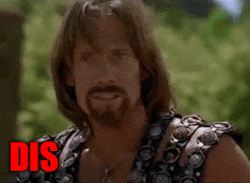
Warning, here there be ranting and it might be hyperbolic.
Can someone else take over writing this thing, please?
I don’t know which is worse. The poor characterization of the old Dreaming comics of the late 90s and early 2000s or the hamhanded allegories in the new The Dreaming. Poor Merv is now literally a Straw Man about bigotry. And the Lucien narrations aren’t... good...
I know everyone wants to bring their own flavor to The Sandman Universe and only Neil Gaiman can and will sound like Neil Gaiman but this doesn’t even feel like the characters. This feels like a self-righteous Marvel comic from a year and a half ago... And yes, I know that Vertigo is a division of DC, I’m just making the comparison.
And why the Hell has poor Merv been turned into a thinly disguised Trump Supporter stereotype? He was always an ass but he was an equal opportunity ass. WHY would you even WANT to use the blue collar, pumpkin headed scarecrow as your bigot metaphor? You just made a LITERAL strawman. This is almost as bad (if not worse) than using Cain to represent misogyny.
Much like a certain late 90s / early 2000s version of The Dreaming I sense no love for these characters. It feels like resentment or a belief that they can be used to represent anything at all and to Hell with consistent characterization.
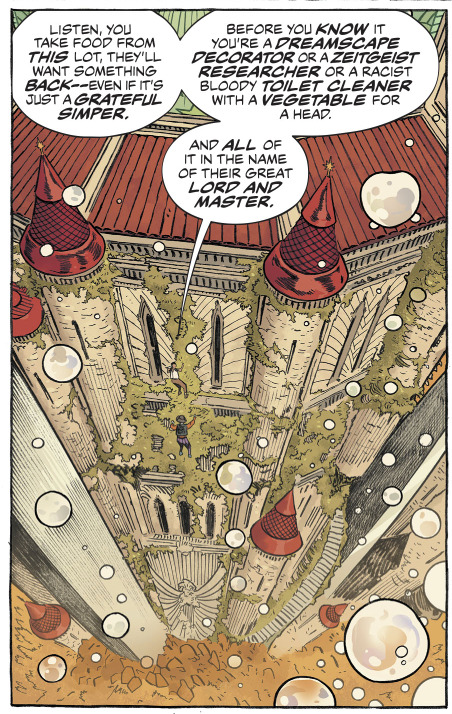
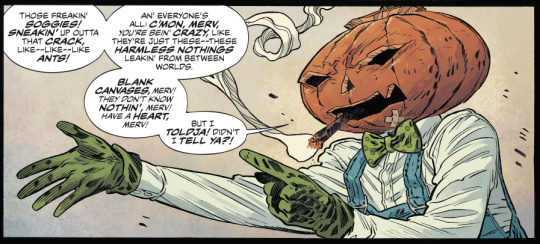
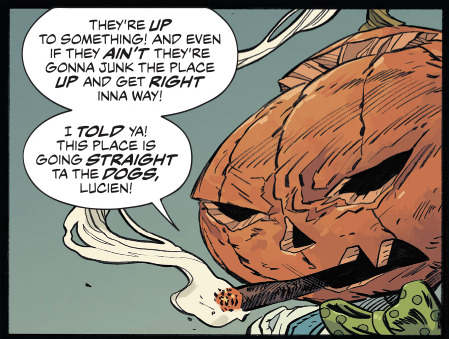
The Dora-needs-sex scene in issue 1 of The Dreaming felt so pointless other than “Look at us! We have adult content! Wheee!” It’s like counting all the F bombs in Spartacus: Blood and Sand and realizing most of them were used as filler and or just to remind you that you were watching Starz.
Some dialogue is just unpleasant to read. (“Get thee behind me, Creeper.”) First, Dora, you were created in the 90s. Creeper wasn’t the usual term in mid-90s. It was usually just creep. I guess she could have picked up on the word from a dreamer so it’s not that bad but she still dresses and wears her hair like the 1990s.
Also, Dora, you just slept with this demon and now you’re threatening to crush this being’s testicles for suggesting a bear (which is literally an extension of himself) take part and how dare he still be horny! As gross as that is, you’re not dealing with a normal bear or normal place and this scene doesn’t “empower” me as a woman. Anyone else feeling “empowered” by this?!? Threatening a horny demon immediately after sex with him doesn’t give me a “girl power” feel. Actually I was never a fan of that slogan because I remember when it was just a marketing gimmick for the Spice Girls. I wish we had a better woman’s strength slogan.
Another line that stands out was “Malignant penetration”.
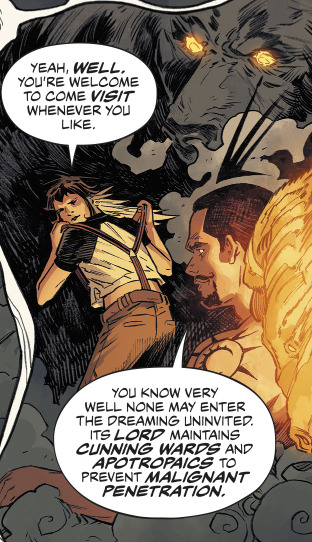
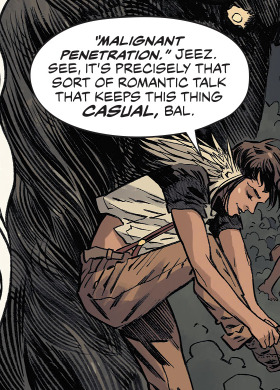
That was was such an inorganic and forced line, I groaned as soon as it appeared, knowing it was just there for innuendo. What the Hell!? This is lazy! I expect better from The Sandman Universe.
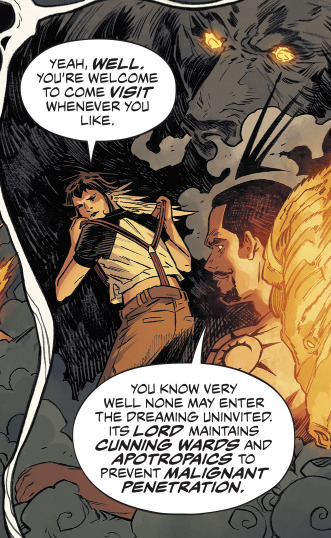
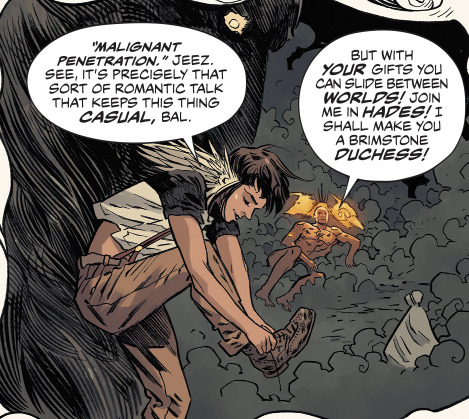
Way to phone-in witty suggestive dialogue...
At least they know Brimstone smells like a fart...
Why is it every “empowered” female character has to be edgy, angry at authority, and with a chip on her shoulder now? It’s turning into a tired cliche. Do we need to be angry and resentful to be “empowered”? I’m starting to hate that world, “Empowered.” It feels contrived and when you sit and think about it, it has a pandering quality that suggests we had no power to begin with. But that’s a tangent for another day.
I’m also starting to get annoyed with being smacked in the face with constant reminders that Dora is “Different” and “Dora is special” and “Dreams aren’t supposed to be able to do that” ect... How many times are you going to tell us how unique she is?
Also this is getting so blatant. Lookie, they’re still forming. They need to be educated. They’re innocent and still taking shape. And they’re not really blank after all. But they can barely speak the language. And they’re being rounded up by someone who doesn’t care or understand them and kept in pens. These are children in detention centers. For God’s sake!
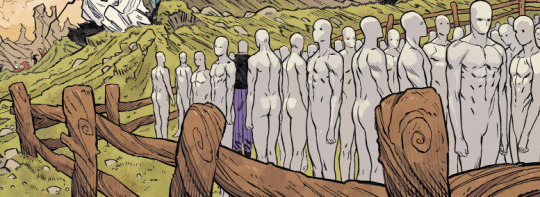
Merv is creating detention centers for children...

And they are refugees that need sanctuary. This isn’t symbolic. This is blatant. And I feel like I’m being treated like an idiot that is having every little metaphor (and it’s more allegory than metaphor) explained to me. I don’t mind when writing can make me feel like an idiot (Like discovering the cat in Sandman: Overture was Desire all along) but I don’t like being treated like an idiot who needs everything explained to them.
And I am dreading what they are going to do to our favorite Jack-o-Lantern and his personality for the October / Halloween issue.
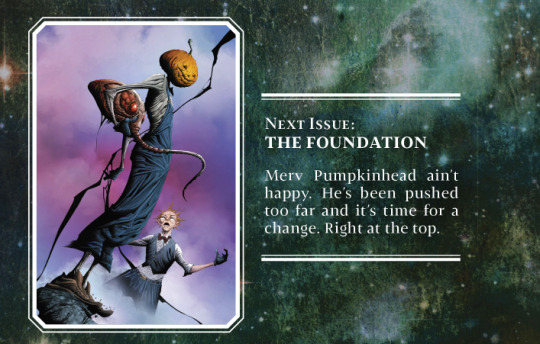
This is not Merv. “Make The Dreaming great again” should NOT be a thing. You have taken the blue collar construction worker type and turned him into an obnoxious allegory. As I said, Merv was always an ass but he was OUR ass and he never acted quite like this. This is one of those obnoxious over-the-top political statements that made me wander from Marvel and be embarrassed that I’m a liberal.
This is also teetering on classism that the only character that can be classified as blue collar worker is the one being used as an ignorant bigot. Merv had his likable moments in the original Sandman. This is bordering on offensive.
Also, could someone kindly tell the new writer that unless Daniel manipulated the Griffon’s memory to make him think he was a gift from The Greeks, the Griffon is not of The Dreaming and there for should NOT be changed by the weirdness going on. He was a gift from the Greeks.
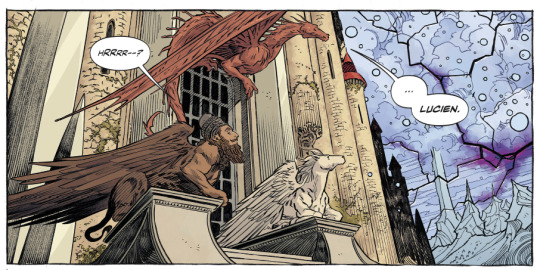
At first I thought The Griffon looking like that was a result of the weirdness going on in The Dreaming and then I was like “Wait a second. Either Daniel tricked the re-created Griffon into thinking he wasn’t of The Dreaming or he is, as The Wake told us, a gift from the Greek Gods.)
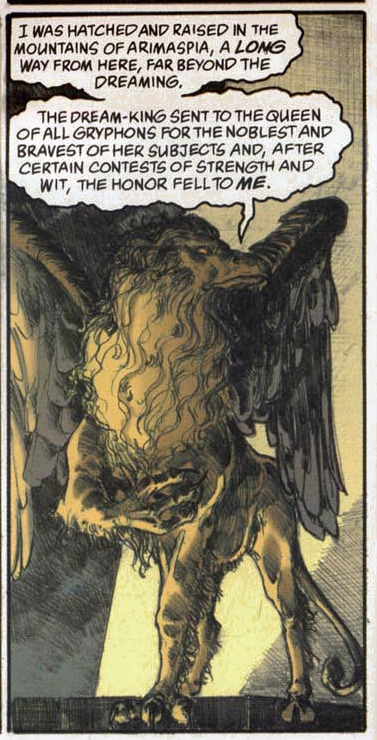
And now Daniel is being messed with and he’s not even in this! Here, I’ll show you how...
Lucien, disguised as Daniel (and The Dream entities somehow fall for this...) tells Merv to teach The beings and to care for them. And somehow this is supposed to be out-of-character for Daniel. Uhh... Why?
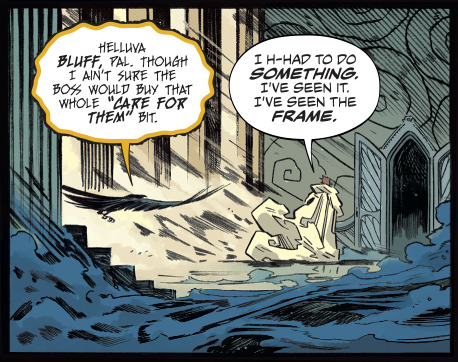
Why do people keep thinking Daniel is supposed to be cold?! Daniel is supposed to be the warmer, kinder aspect of Dream.
And yet, here’s Morpheus during his douchiest phase.
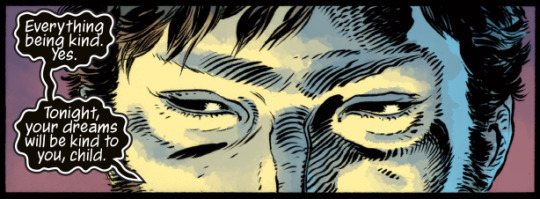
Why is it whenever someone other than Neil Gaiman writes Daniel he comes off colder and meaner than Morpheus at his darkest? I wrote a post a while back explaining my theory as to why this happens but it still baffles me...
https://thenightling.tumblr.com/post/175624611158/theories-about-why-dc-writers-have-not-handled
WHY is the “Care for them” something he wouldn’t say, exactly?!
And poor Lucien. The constant monologue is weird and yet people are acting like he’s always done this. Uh... Since when? It was Morpheus who did most of the narration in the early Sandman and in Sandman: Overture. Granted there was the weird talk bubble in Dark Night’s metal that made Lucien’s text look like Morpheus’. It’s enough to conceive a new and weird conspiracy theory.
I’m not really comfortable with poor Lucien’s forgetfulness. I’m afraid that like the illegal immigration / refugee allegory in that this will be a poorly handled alzheimer's metaphor.
Okay, I’ve bitched enough. Now for things I actually like to try to make this post a little less angry and aggressive.
I like that there’s something mysterious building but I’m afraid it’ll be a let down and something as mundane as Starro again...
I like that now there’s actually a reason Daniel isn’t intervening.
I love the artwork.
I haven’t entirely given up on Dora’s potential. I’m still curious enough to want to know what’s going to happen.
There are parts actually written well and interestingly, almost like Neil Gaiman, himself.
And I am still glad that there is new Sandman content but this wasn’t a great first taste of The Dreaming. I had liked The Sandman Universe 1 well enough but this (The Dreaming 1) ... not so much...
Anyway, that’s my review of the new Dreaming comic. Ultimately it wasn’t as good as I hoped and I’m not thrilled with the preachy feel of parts of it. And Doria’s interesting quality from The Sandman Universe is starting to wane in favor of a cliche chip-on-her-shoulder “empowered” trope and that bugs me because I want to like her.
Anyway...
https://www.youtube.com/watch?v=_O1hM-k3aUY
youtube
@deathlyendless @zalemoonshadow @sorry-for-the-chocolate @endlessemptynight @minxymojo @vagaryhexxx @thejediviking @fortmarmorus @winterbirdybuddy @treebrooke79
11 notes
·
View notes
Text
Book Discussion Challenge: Vampires
May 26
I’m going to reminisce about vampire lit that I’ve read starting way back from 2002. All aboard my nostalgia train, it’s got vampire books on it*. Warning: It’s only me prattling on about my history of vampire books for about ~2,000 words.
2002 The Year of Scholastic Vampires, 8-9 years old
This was the first vampire book I ever read:

Cracked Classics: Trapped in Transylvania by Tony Abbott. I got it when it first came out (at one of those school book fairs or something) at around 8 years old and reread it over and over again. I read the other books in the series too but this one was special. It’s a portal fantasy about two kids Dylan and Frankie who get transported into books via the “broken” but ~magical~ library security sensors. What this book showed me was that I needed more vampire books and fast.
So I went on the prowl and found:

The Cirque Du Freak series by Darren Shan - it felt so edgy for an 8 year old. And I loved it. It was probably the first series that I actually completed finished. (No I haven’t read the Larten Crepsley Books...are they any good?) I loved the worldbuilding, the vampire culture, though now looking back, it does seem pretty sexist with the “Women don’t stay vampires for long because they want babies too badly so they go crazy and die lol” thing (did that happen or am I confusing it with another series?). But that’s besides the point, that flew over child-me’s little head.
2003, The Year of Pulp, Folklore, and Teacher Interventions, 9-10 years old
After that there was several other books a lot that have since faded from memory: A lot of “Vampire Encyclopedias”, pulpy and gorey obscure nonsense - from the child friendly to the “Your child is drawing bloodthirsty wolves again” and some truly trashy stories.Which of course I delighted in.

-I actually found this book again at a Book Sale. Funny enough, I think it’s my copy. So I bought it again. I’ll have to give it a reread someday.

I remember reading this one in particular cover to cover in the summer by the pool in ‘03. Unfortunately, I moved often I don’t have my original books anymore. But it had all sorts of different vampire folklore, filmographies, medical illnesses, hoaxes all wrapped up in one heavy tome. I did manage to watch A LOT of vampire movies this year.
Speaking of vampire movies, I was a fan of the Blade movies and because of that I read:

I think most people would notice by now that I had free reign over whatever I wanted to read or watch. Which was so liberating. I don’t think people realize how children aren’t given much control over their lives and free time. And that choosing reading materials without judgement is so freeing for this age group. Enough of that. Blade was awesome. The movies were awesome. The comics that I read perpetually out of order so I never understood the continuity were awesome.
2004, The Year of Bloodthirsty European Castle Dwellers, 10-11 years old
At eleven, I saw this exact copy of Dracula:

-And it told me “You have dawdled enough, it is time,”
So my mom bought me this copy. (Don’t ask why it had to be this exact one, I don’t know my reasoning.)
I absolutely loved it. I was nervous to start reading it but decided I was prepared. I watched countless vampire movies, many of which were Dracula inspired, I read other vampire books, and all I did was hope that it would hold up to my expectations. Nothing compared to the chemistry the characters had in this book and the devotion they had to one another. At eleven I remember thinking it was a “cool team”, and I paid attention to the markers of vampirism and the difference between the movie versions.
After reading Dracula I wanted to know more about ‘Vlad the Impaler’, Transylvania, and these historical events Stoker drew from and thus came this book:

I read a lot of articles online as well. The origins of vampirism fascinated me as a kid. I marveled at the worldwide phenomena of vampiric folklore. I wanted to know more about Elizabeth Bathory since she had vampire hoaxes, rumors, and allegations hurled at her. So then I got to reading more about this woman:

Mostly articles online. Which was for better or worse. I remember weeding through a lot of conspiracy theories in order to get to more realistic, evidence backed, biographies. And there are many, many, many weird theories about Elizabeth Bathory out there that 12 year old me should not have read.
2005, The Year of the Plague of Crappy Vampires and the Birth Year of My Pettiness, 11-12 years old

I don’t know how I got this book (actually I think it was my little sister’s and she gave it to me), Vampire Plagues: London 1850. It’s important to note that I was incredibly petty as a child and despite reading the first three books, I still loathed it. I think this was a series child-me was rage reading. Sorry, Sebastian Rook, it seems I never gave your series a fair shot.
I’m only sticking with the ones I definitely read in definite years -for the sake of linearity! I saw this next book at the library:

Thirsty was a weird gay allegory that depressed me. I didn’t like how it equated being gay with being vampire even though I know the author had good intent. I read Feed before I read this one. Which I liked a bit more.
2006, The Year of the Sacrificial Vampire,12-13 Years Old
I had A LOT of books. But unfortunately, they couldn’t all come with me. So I lost a lot of my favorites. My Cracked Classics was falling to pieces anyway, it was thrown away long before then, Dracula survived, Weird Tales and a lot of my other pulp anthologies got lost or I got rid of. (I did, believe it or not, have other interests besides vampires) so it seemed only natural that some vampire books would need to be sacrificed for the sake of my newly culled collection. Cirque du Freak made it only because the series wasn’t quite complete yet it got culled in a later year if I recall correctly.

A lot of people’s first Westerfeld is Uglies, which is a fantastic series, but I started with Peeps. I got it from the library and read the duology over a weekend. I remember enjoying the concept of the disease but the plot and characters were ultimately mediocre.
2007, The Year of: “HAVE YOU READ TWILIGHT YET?” The Apex of My Pettiness or the Stalemate, 13-14 years old

In my group of friends Blue Bloods was the “in book”. Not Twilight. Even though Twilight was HUGE. Even before the movie. My friend Skyler was angry that Twilight was so popular when she believed Blue Bloods to be superior. I never did get around to the Blue Bloods books even though she gave me the first in the series. I think this book was lost into the oblivion in a later year. Sorry.***
I did wind up reading the first two Twilight books to spite Skyler. I didn’t enjoy the series enough to continue it. Vampire Academy came out this year too. But I never read that either. (I think).

Another vampire book I did remember reading in 2007 was Vampire High. It’s some obscure book that I only remember because I thought it was unremarkable. I think I read it to spite Skyler actually because I remember pretending to love it at the time.
2008, The Year of Edgy High School Freshmen Watching True Blood, 14-15 Years Old
The first vampire book of the year was probably this one:

It was my first Stephen King. And weirdly enough, I haven’t read another since even though I thought Salem’s Lot was good. I don’t know why I haven’t gotten back to King actually. Huh. That’s weird. Anyways, in this summer I found this book:

Sucks to be Me was adorable. I don’t remember reading the sequel. But it was the perfect summer read for me at the time. I liked Mina as a character and thought how vampirism takes place was neat-o.
2009, 15-16 Years Old, The Year of SOOKEH Ends With a Were-Tiger
I never watched Vampire Diaries or any other vampire show. Kolchak was my one and only. And even though there were other monsters in the show, it’s still kinda a vampire show because they did turn up in one episode. I did watch True Blood. And because of that during the summer I read this:

I read the Sookie Stackhouse books poolside in the summer and poolside on winter break. I had a lot going on that year and thus I read a lot of light stuff in my spare time. I think I stopped reading these books at #6 because then it started getting ridiculous and the plot holes got bigger and bigger. Around 2011 is when I lost interest in True Blood as a TV series. But I’m getting ahead of myself here.
2010, 16-17 years old, The Year of the Coupon Clipping Vampire
Around this time is when I got my first Kindle. I didn’t mention my first Nook (which I got because my nook was a loathsome creature that hid under my bed and growled when I tried to awaken it from it’s dormancy). My Kindle, didn’t. And it was an awesome fellow.
Around this time I found various free or 99 cents books. Some had vampires some didn’t. Some were a bouquet of typos some weren’t. But discovering something that was good enough, was a fun process. One of the more notable titles that I read through was:

My Blood Approves for those who don’t remember it was very popular. Like a #1 best seller on amazon or something extreme. I was lured into reading it by the very low price tag. It was a bit of a guilty pleasure and again I had a hectic life so this series was an easy read. Except, then she never finished the series. It was like a B-movie in book form. The Bloody Bros were real annoying at times. And my teenage blood did not approve of Jack or Peter I really didn’t like how Jane was offed either.
2011, 17-18 Years Old, The Year of Letting the Vampire in a Year Too Late
I didn’t get to watch Let Me In (2010) the previous year. Because unlike vampires I do have a life. But, I did get to read the book in 2011:

Notice how I read more in my childhood versus adolescence? Heh. That’s high school extracting my soul. Let The Right One In was amazing. I remember making all these theories about it, putting sticky notes in my beaten up dogeared coffee stained library copy and doing an in-depth read.
2012, 18-19 Years Old, The Year of the Dorm-room Dracula
So this is the year I graduated high school and when I went back to Dracula, same edition from my childhood. It was one of the first books I read in my college dorm room.

Except this time I noticed the xenophobia, how women were treated throughout, the religiosity, and how it really did reflect a Londoner’s thought process at the time. I still love it but understood it on a deeper level than the eleven year old who saw friendship conquering evil, cool monsters, and familiars.
2013, 19-20 Years Old, The Vampire Gap Year
No vampires here. No fun here. No anything here.
2014, 20-21 Years Old, The Year of Fickle Lesbian Vampires
I read a lot of J. Sheridan Le Fanu and of course when one reads J. Sheridan Le Fanu they read:

Camilla. I don’t know why it took me so long to read. But it did. I really enjoyed it. Now reading this in the present day it’s cliche and predictable. But then, it was a one of a kind sort of story.
I also read from the same era-ish:

Varney The Vampire was originally a serial, in it’s final book published form it reads a bit awkwardly and it’s contradicting. Varney is an erratic and fickle train-wreck. The book is full of oddities like the author had so many ideas where to take the story and couldn’t choose on which way was the best way. So he took them all.
It felt relevant at the time to me. I didn’t know what I wanted to do, I knew I couldn’t do everything at once - and if I tried it would wind up being a penny dreadful that no one bothers to read anymore. I knew I had to make a choice and I knew I had so many choices out there. But I could only choose one. Varney gave me the motivation to not be a fickle train-wreck basically. In a “don’t be like me,” fashion.
2015, 21-22 Years Old, The Year of The Baby Vampire
So this year I actually chose a vampire book for an assignment it’s not one you would expect:

Going full circle, I started again with an even younger version of Dracula than Cracked Classics. It’s only a counting primer for very young children. And I used it in an essay about inspiring children to become readers. Whether abridged works encourage or discourage children from reading the originals, to using comic versions of classics, modern young adult versions of classics, etc. Even though this book wasn’t around as a young child, it’s definitely one that would be cute for an infant’s library.
2016, 22-23 Years Old, The Year of Dirt Filled Coffins
Nothing happened here. Keep going.
2017, 23-24 Years Old, The Year of Vampires Returning For Good (Maybe)
And now we’re almost at the point of departure. I’m most likely going to read Dracula again this year, unfortunately I lost my old Dracula book at college. I’ll need to go to the library to get a good edition. (I want an annotated edition). I’ll have to buy a new one someday though maybe I’ll choose a different edition this time. Besides the same old Dracula by Bram Stoker here are a few other vampire books I have on my TBR:
Fledgling by Octavia E. Butler
The Vampyre by John William Polidori
The Vampire Tapestry by Suzy McKee
The Powers of Darkness by Bram Stoker & Valdimar Ásmundsson
The Gilda Stories by Jewelle Gomez
Fevre Dream by George R.R. Martin
I think the big question now is why? Why did vampires appeal to me? Vampires appealed to me as a kid because I didn’t want to grow up, I didn’t want the responsibilities that came with it, (and, to be honest there are some of those responsibilities I’d rather not have now).
Vampires seemed like an escape to a youth that no one could age out of. They often live swankily, stayed up all night, didn’t really have responsibilities, and had supernatural powers including charisma (the inhuman kind), flight, shape shifting, super vision, and/or super strength. And who wouldn’t want that?
I had no idea that such a generous portion of my life could be solely explained by vampire books that I read throughout my life. I had no idea this post was going to be as long as it is. This apparently happened. Get off the nostalgia train, we’re done for now. Unless of course you have vampire books you would like to recommend.
*Thanks for reading. I didn’t think anyone would bother reading this. Wow.
**Not her real name. Obviously.
*** I didn’t read Blue Bloods because Skyler refused to read 47 AND The Decoy Princess - two books I adored at the time and desperately wanted to talk about them to someone. (Granted neither of them were types of books she was interested in anyways she didn’t like time travel and didn’t like fantasy that wasn’t urban/in our world fantasy) This is why “Stalemate” is the alternative title of the year. I guess the stalemate is still in play because as far as I know she still hasn’t read either of them and I still haven’t read Blue Bloods - There’s just a lot less pettiness and more nostalgia attached to it now.
2 notes
·
View notes
Link
You know why I hound @marvelentertainment and take them to task so often about how awful their executives and upper level editorial tend to be? This is fucking why.
There’s a lot of history behind how awful Marvel can be that offsets the moments of genuine good it sometimes offers. My personal interest in Polaris and how Marvel has screwed her over for decades, and especially undermined her for the past decade, gave me a lot of insight into how Marvel really functions beyond its PR machinations.
And I want to stress as I continue: this is not applicable to people like G. Willow Wilson, Cullen Bunn, Mark Paniccia, etc. They’re great as far as I’ve seen, but they have much less authority compared to the people I’m complaining about here.
Axel Alonso and Nick Spencer are here, trying to pretend that what they’re doing has nothing to do with politics. It’s bullshit. We know it’s bullshit because Marvel’s entire schtick for a while now has been about superheroes in a politicized atmosphere.
Fucking Civil War was about politics. Superheroes needing to register, rebellion against registration, Captain America opposing the policies of the U.S. government to resist forced registration as a matter of protecting the values and freedoms of the U.S., that was all political.
Marvel’s entire history is about politics. Captain America was created to push back against the evils of Hitler, the Nazis and fascism, and encourage the U.S. to be part of the World War II war effort. The X-Men were created as an allegory to the civil rights movement. This is Marvel’s roots. To suddenly say this shitty event that’s clearly political somehow isn’t political is a betrayal of those roots.
Let me put it this way: either Marvel is lying when they say this isn’t political, or their decision to continue the event with all its political trappings even if unintended makes them grossly ignorant both of the socio-political landscape and Marvel’s history. There is literally no scenario where continuing Secret Empire as presently established and put forth by Marvel can make Marvel look good.
The refusal of Marvel to listen to feedback and change things if not cancel the event entirely is also incredibly damning. In the past, Marvel was perfectly willing to retroactively explain away things that pissed their readers off and abandon plans they had in mind. In one such case, in the 90s, Susan Storm-Richards started wearing a skimpy outfit with a number 4 boob window after she’d given birth to one of her children. In response to backlash from readers, Marvel explained it away as Malice possessing her.
Marvel’s hands aren’t tied by “the big machine” of publishing either. Yes, they do plan years in advance, but it’s not like that means they have every issue written and printed in warehouses for the next two years just waiting to be released.
But, all of this is assuming Marvel doesn’t know what it’s doing. I think they do.
If you don’t pay a lot of attention to shit Marvel execs and upper level editors say and do, here’s an incredibly common philosophy they repeat everywhere: “outrage is good for sales.” They take the attitude that any time they piss readers off, that actually helps them make more money, because it spreads word of mouth and makes SOME readers buy the issues just so they can see how bad it is and complain about specific problems.
Which is also an ignorant as hell philosophy. It’s short-sighted and narrow-minded. It ignores POTENTIAL audiences and how such actions can dissuade people that aren’t reading Marvel comics from ever wanting to read them in the future. If this philosophy had its way throughout the entire company, Kamala Khan as Ms. Marvel wouldn’t exist.
Secret Empire is just the natural end point of this horribly misinformed train of thought. “Hey, let’s do a comic book event that’ll REALLY piss people off! Make Captain America a Nazi! Make it so that he was ALWAYS a Nazi! No, why stop there, let’s do Magneto - a Jewish man, survivor of the Holocaust who lost his family in the genocide - too! People will line up around the block to read how we fucked it all up just so they can yell at us on the internet!”
For fuck sakes, Marvel.
Ultimately, if the backlash gets REALLY bad, they start making half-assed excuses - like they did here. “It’s not political,” Axel Alonso and Nick Spencer say, as the comic advocates for fascism and turns long-time anti-fascist heroes into the very thing they were created to oppose. “Trust us and wait until you see what we have in store for Scarlet Witch and Quicksilver before you complain, it’ll all pay off,” Tom Brevoort says after that forced retcon in Axis that made the Maximoff twins suddenly not Magneto’s kids anymore. Followed by years plodding useless bullshit that hasn’t once provided any kind of pay-off for fans of those characters.
Marvel’s chronic problem is this: they do shitty things for shitty reasons, and when they’re called on it, they provide shitty excuses that literally anyone can see through if they take five seconds to think about it. Marvel doesn’t know how to own its mistakes anymore. Marvel doesn’t know how to make amends for its mistakes. Marvel only knows how to lie and bullshit its way along during controversies, following their egos to the bitter end.
I learned this years ago as I saw Polaris excluded from events she should’ve been a part of, or how her first book as a full-fledged leader in her own right got canceled for “lack of sales” when it received zero support from Marvel (while other books selling much worse got to last longer), and so much else. In every case, Marvel had a poor excuse.
“Polaris can’t be in Avengers vs X-Men because events are only for A-listers and B-listers, and she’s not one of them!”
“Polaris can’t be Magneto’s daughter because of genetics breeding true, but Siryn can be Banshee’s daughter because reasons!”
At Marvel, for the people at the top, it’s never about putting their best foot forward and listening to their readers. It’s always, always about doing whatever the fuck they want and then making up excuses for why that should be the case. They don’t work for the fictional universe they’re supposed to curate, and they don’t work for their readers either. They work exclusively for themselves.
Before I end this rant, I want to remind anyone reading this of one very important point: Ike Perlmutter is the current CEO at Marvel, with control over the comic books. He was kicked out of involvement in the Marvel films because of how he meddles with things. It’s an open secret that he’s responsible for the past decade of Marvel doing things to undermine the Fantastic Four and X-men entirely because Fox owns the film rights to those franchises.
Why does this matter in this specific instance? Because Ike Perlmutter supported Donald Trump’s campaign last year, and works with Trump on veterans affairs. Trump even explicitly cited Perlmutter as THE name he talks with on the subject, in a brief interview last month where he said he was going to have a meeting about it at Mar-a-Lago (which got canceled).
That’s who’s running Marvel. Given everything else I just said, what are the chances Perlmutter isn’t partly responsible either directly or by reputation for Marvel suddenly putting out this “non-political” event that turns heroes into Nazis and claims they were Nazis all along?
10 notes
·
View notes